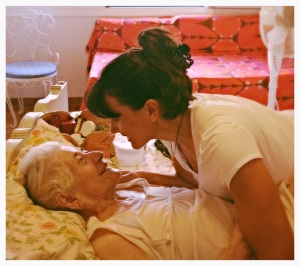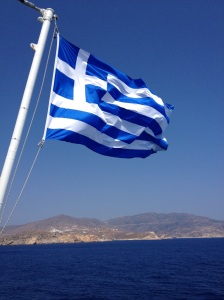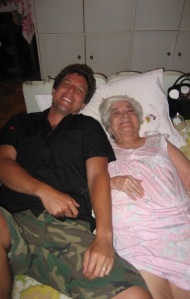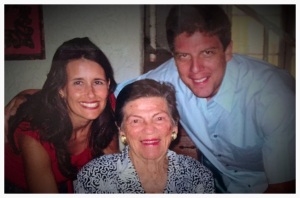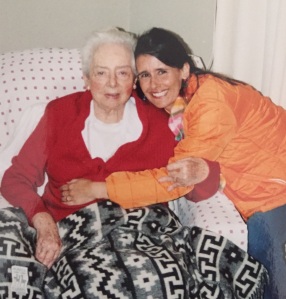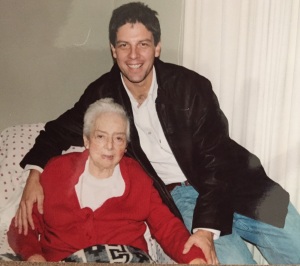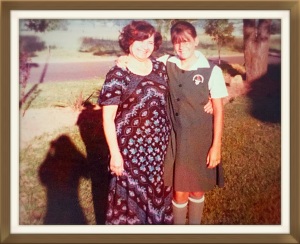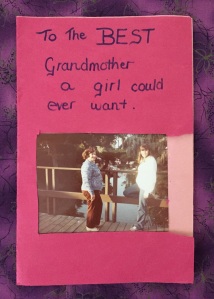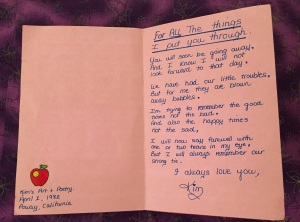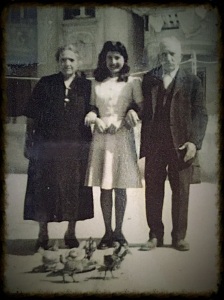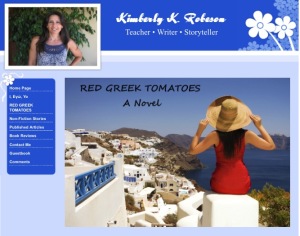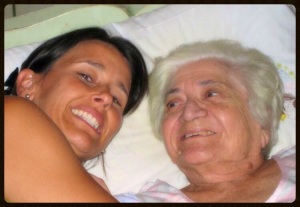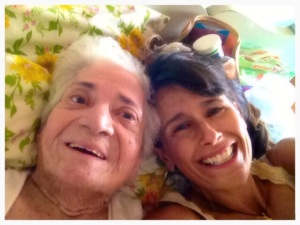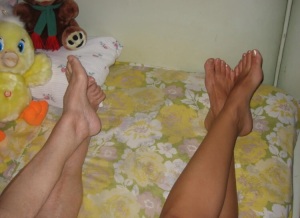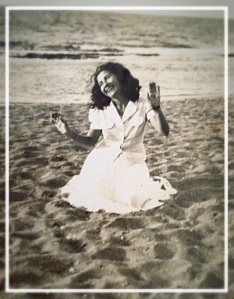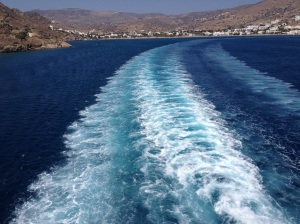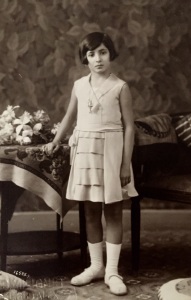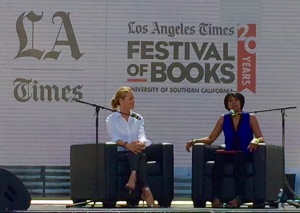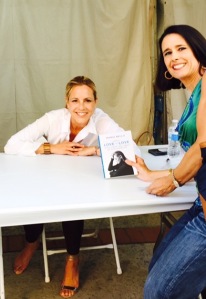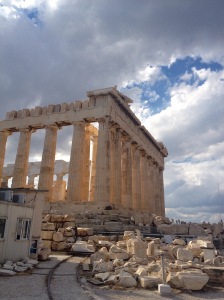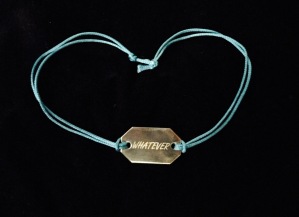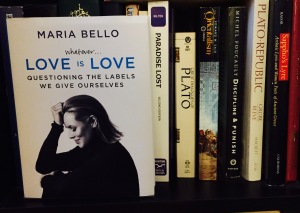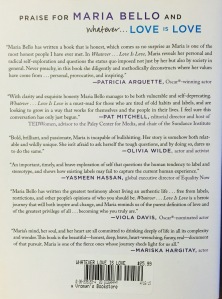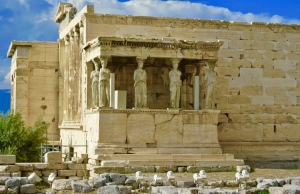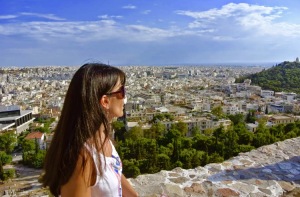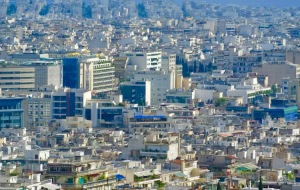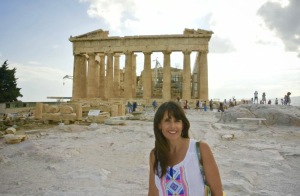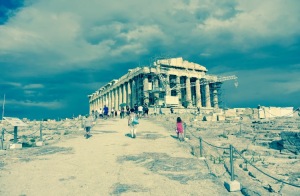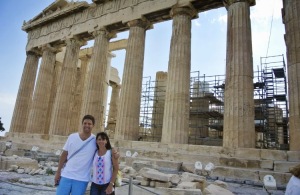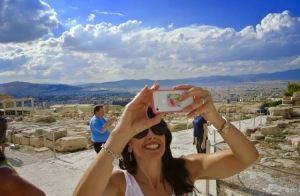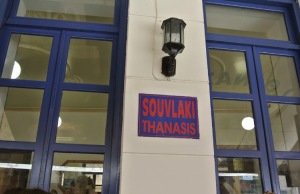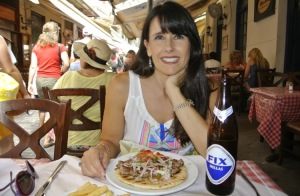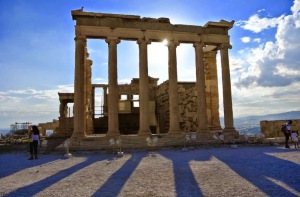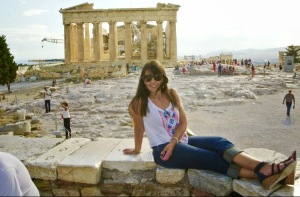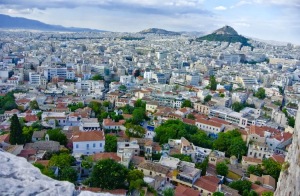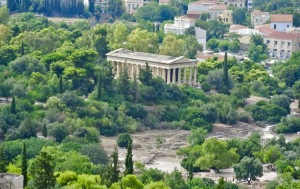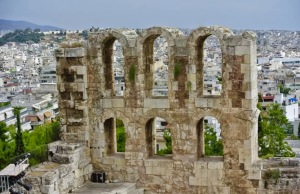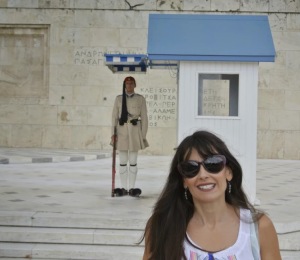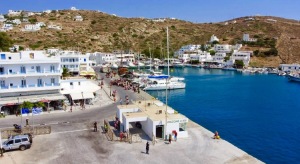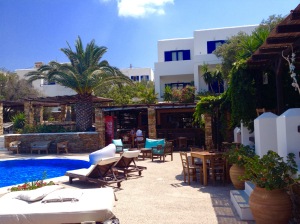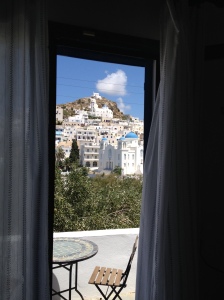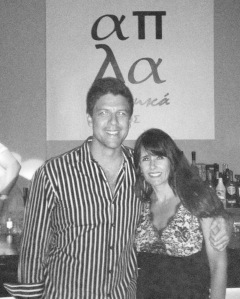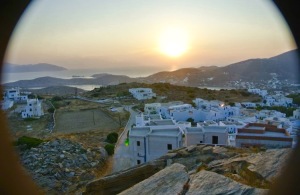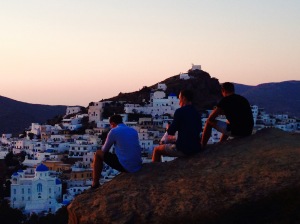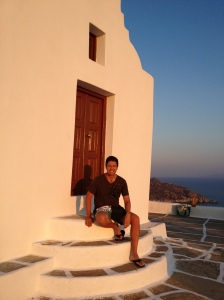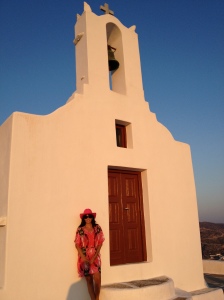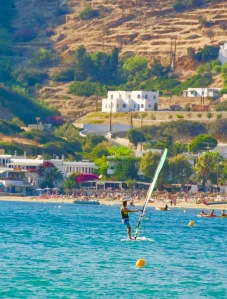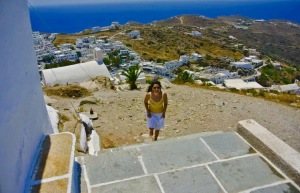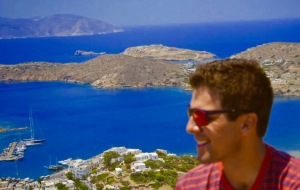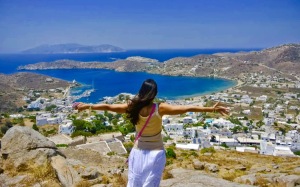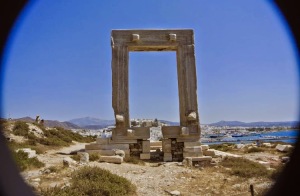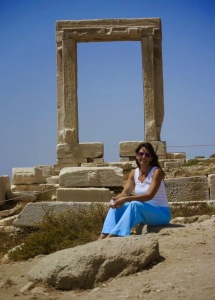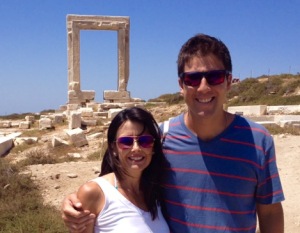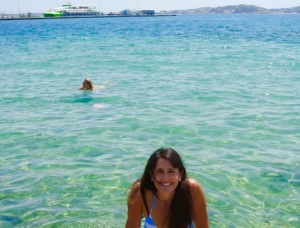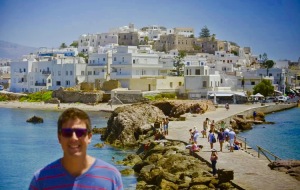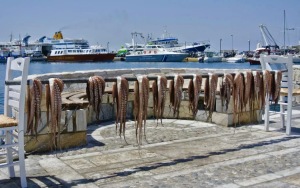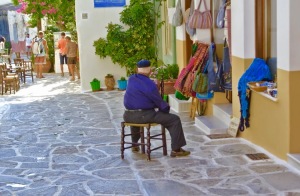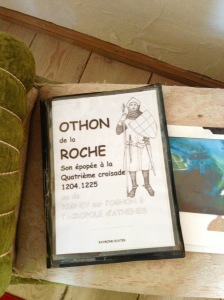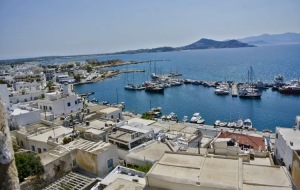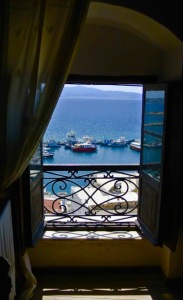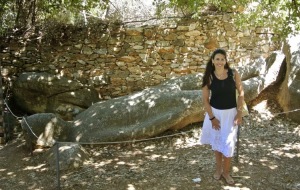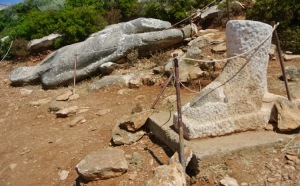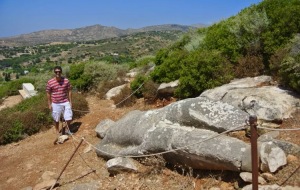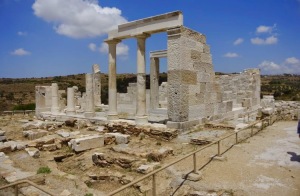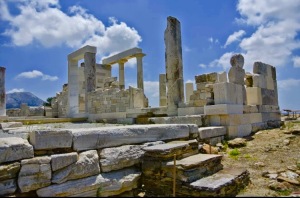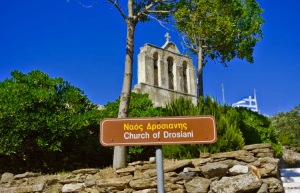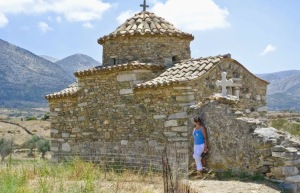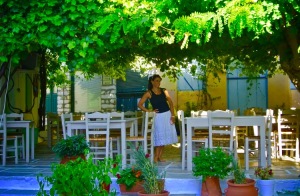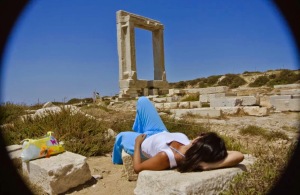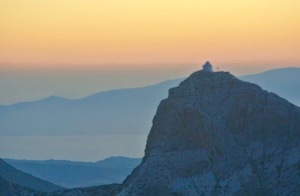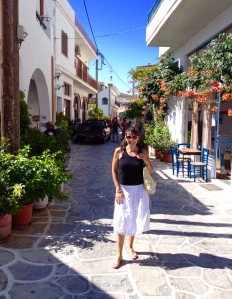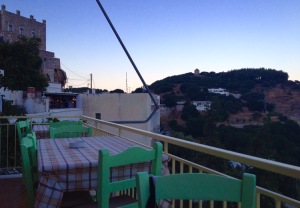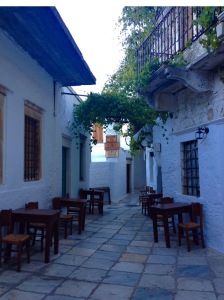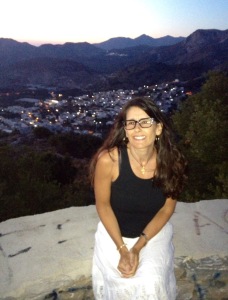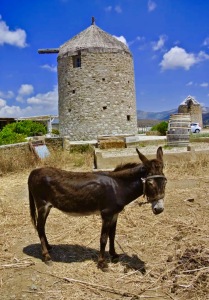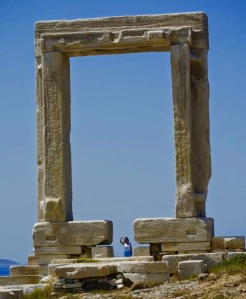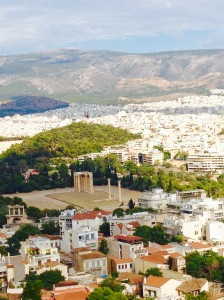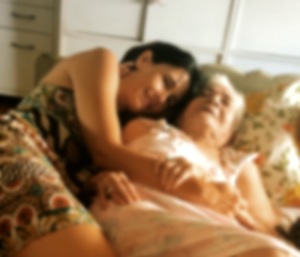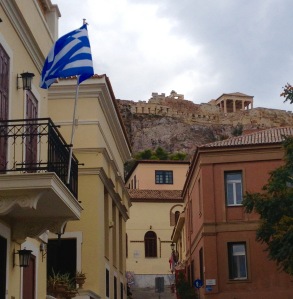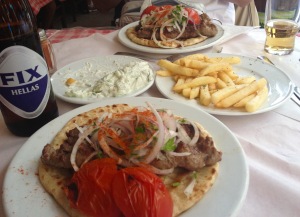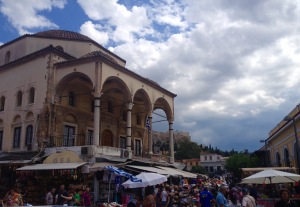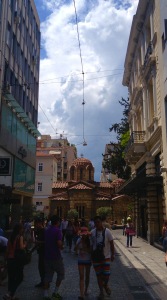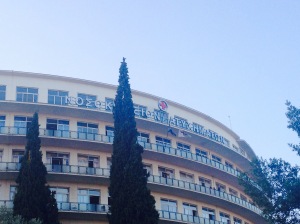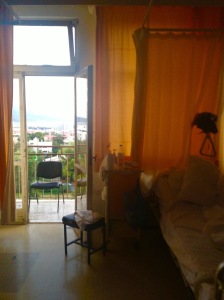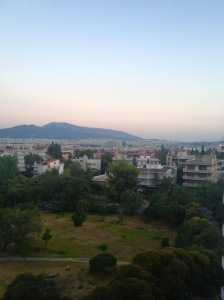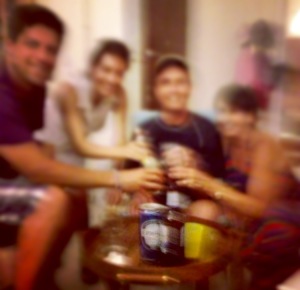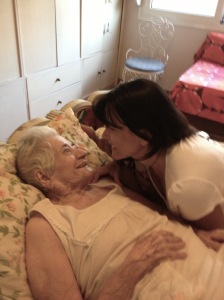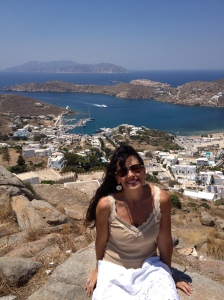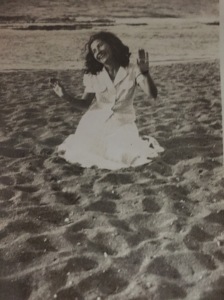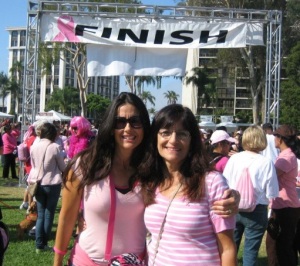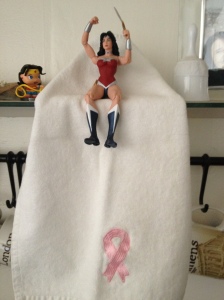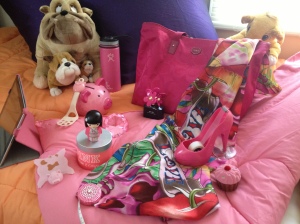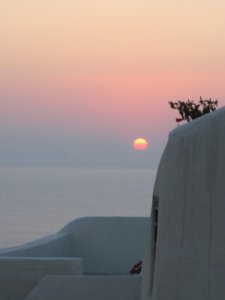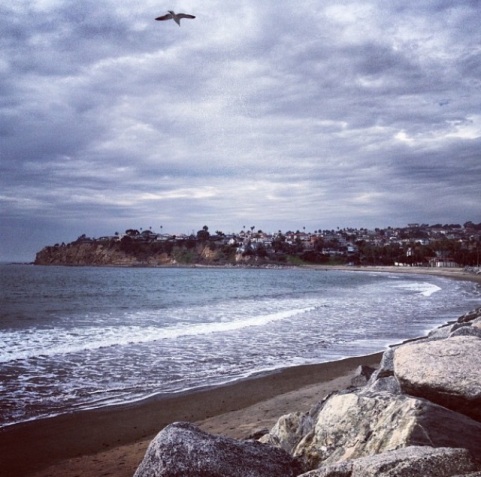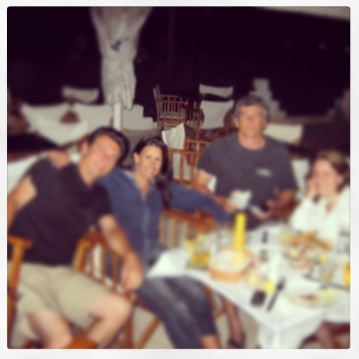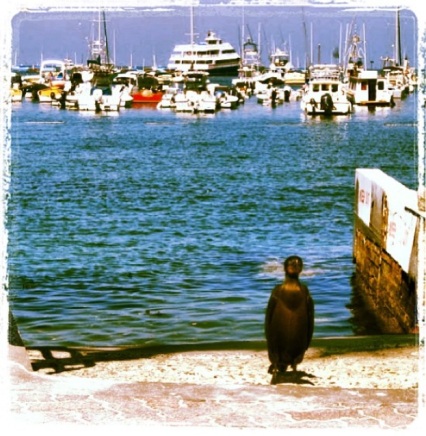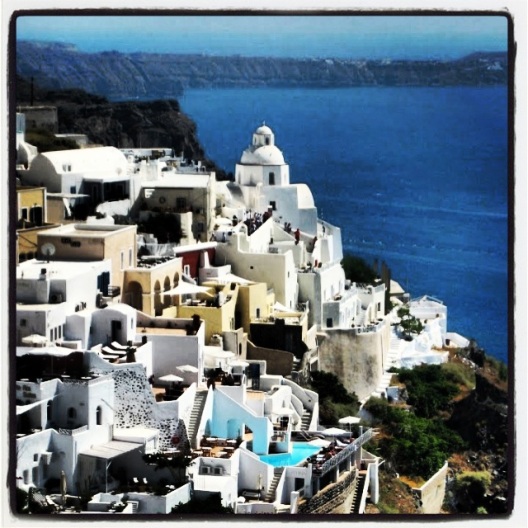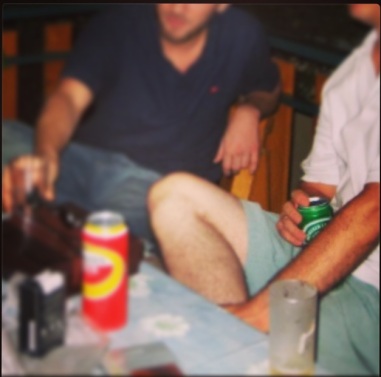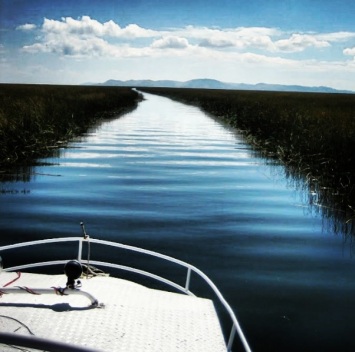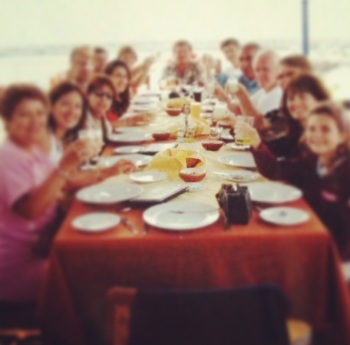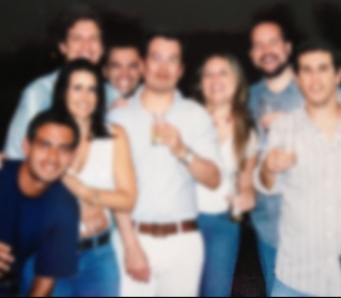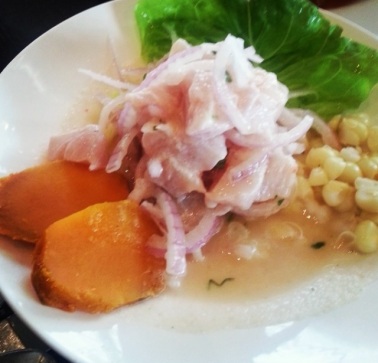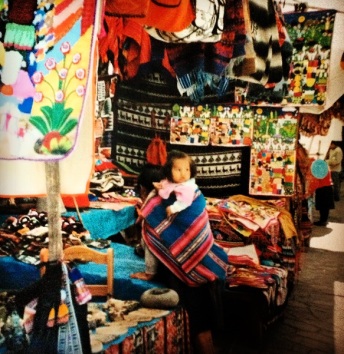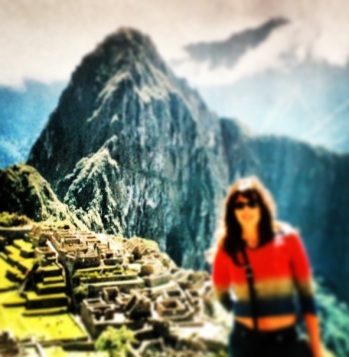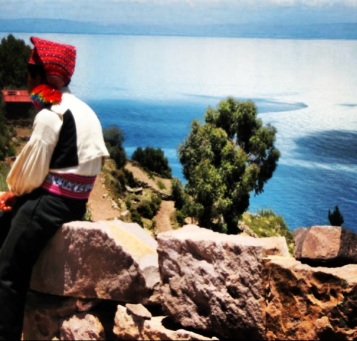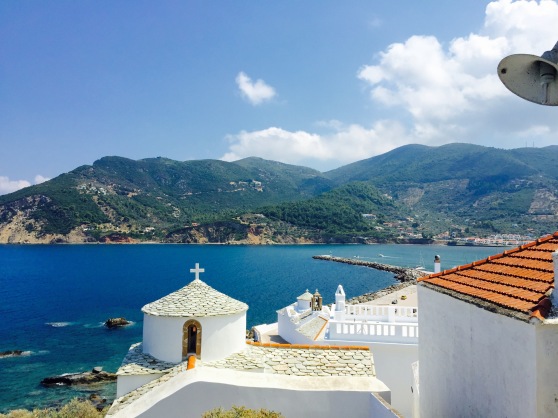 Reflections of Summer by a Greek American: Travel Tips and Personal Stories
Reflections of Summer by a Greek American: Travel Tips and Personal Stories
It’s in the air. It’s in their voices. The instability. The frustration, the anger—but those are not the constants. The pride. The loud voices, the grand gesticulations, the love of their country: those remain static. Greeks are fiercely patriotic and proud; at times stubborn and sardonic—but always faithful with a fighting spirit.
Nevertheless, genuine fear has encroached upon the lives of many Greeks, and Summer 2015, with the climax of the crisis, the outlook looked dire. It was a strange time to be in Greece this past summer, but the looming crisis was also precisely why my husband and I chose to return after a year’s absence. If we had a few dollars to spend on a summer holiday, why not drop them in the country that is closest to my heart? That was one good reason, but seeing my Greek family took the top slot. When I heard my aunt’s anxious voice through the phone line in June, it made my desire to be close to my relatives even more powerful. I needed to be in Greece, see their faces, hear their stories, and—more selfishly—I wanted to stroll the streets of Athens, sip my Loumidis coffee on the balcony of our summer house, eat calamari with a xoriatiki salad, and visit an island with my favorite travelling partner.
Despite the country’s financial crisis and my family’s suffering, I was and am painfully cognizant that others are suffocating in Greece; yet, for me, Greece is—and always will be—the country that lets me breathe.
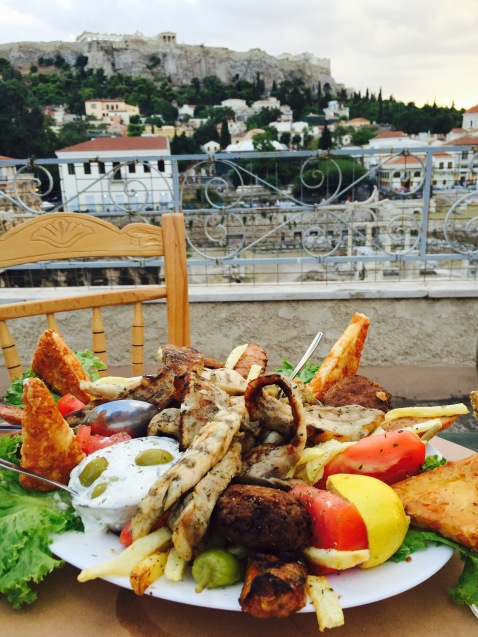 When I’m in Greece, I’m another person. I drink wine by the kilo, eat lots of bread dipped in tzaziki, devour souvlakia filled with greasy gyro, suck on endless red Greek tomatoes—and I never step on a scale. Funny thing is, I don’t gain a pound. There is a lightness inside that permeates outward, sucking away the fatness of stress. Of course, I am on vacation with time, money, and a fun husband—why shouldn’t I be happy? But it’s something else. Being around Greeks, in Greece, recharges my battery. These people are beyond resilient, and this vivacity gives me strength. If Greeks can struggle, fight, and still laugh, then so can I. Despite the melee, Nike still seems to fly over Greece and, I believe, in time they will be victorious.
When I’m in Greece, I’m another person. I drink wine by the kilo, eat lots of bread dipped in tzaziki, devour souvlakia filled with greasy gyro, suck on endless red Greek tomatoes—and I never step on a scale. Funny thing is, I don’t gain a pound. There is a lightness inside that permeates outward, sucking away the fatness of stress. Of course, I am on vacation with time, money, and a fun husband—why shouldn’t I be happy? But it’s something else. Being around Greeks, in Greece, recharges my battery. These people are beyond resilient, and this vivacity gives me strength. If Greeks can struggle, fight, and still laugh, then so can I. Despite the melee, Nike still seems to fly over Greece and, I believe, in time they will be victorious.
One victory was tourism. Many visitors ignored the fearmongers and did not take heed to negative propaganda and, instead, “hashtag visitGreece” took over. Tourism was up 2% compared to last year according to U.K.’s Daily Mail (July 20th, 2015). While eating at Thanasis in Plaka, we met a man who works at the airport in customs and he said it was up 10%, a family member told me 22%. Suffice it to say, tourism did not drop. In fact, as I walked the streets of various Greek cities, towns, and villages, on the mainland and on Skopelos island, I saw crowds of people, both Greeks and visitors, and I heard a lot of laughter.
ATHENS
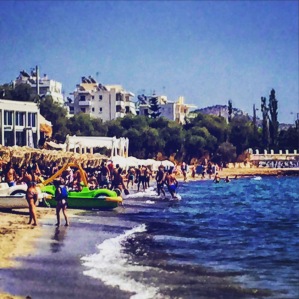 Playing with my cousins and their kids in the blue water of Vouliagmeni reminded me why Athens is my favorite city in the entire world. Some parts of the city such as Kyfissia and Kolonaki offer posh shops, cafés, high fashion, and people-watching; other districts like Glyfada and Voula have the aforementioned but also provide island-like beaches—complete with chaise lounges, umbrellas, and cafés on the shoreline. For a few euros, one enters and can stay all day; have the freedom to drink beer on the beach or have a freddo cappuccino, and then a club sandwich or a tyropita. Somewhere in between these districts is Nea Smirni, where my family reside, and where my mother owns a house. I adore the neighborhood and feel quite at home there as does my husband who has visited six times. If I’m deep in Greek with my cousins, my husband disappears to the local platea (district’s center) to get a gyros at his favorite taverna or to relax at his favorite café. He knows how to say, “Freddo cappuccino metreo” and “Then milao Ellinika” (I don’t speak Greek). When we first met, he asked me how to say, “Hello, how are you?” So I taught him: “Eho geneka Elinitha, i kaliteri.” It was years later when he greeted someone with this phrase that I realized I had forgotten to tell him it actually meant, “I have a Greek wife and she’s the best.” But he forgave me and we still have a good laugh about it.
Playing with my cousins and their kids in the blue water of Vouliagmeni reminded me why Athens is my favorite city in the entire world. Some parts of the city such as Kyfissia and Kolonaki offer posh shops, cafés, high fashion, and people-watching; other districts like Glyfada and Voula have the aforementioned but also provide island-like beaches—complete with chaise lounges, umbrellas, and cafés on the shoreline. For a few euros, one enters and can stay all day; have the freedom to drink beer on the beach or have a freddo cappuccino, and then a club sandwich or a tyropita. Somewhere in between these districts is Nea Smirni, where my family reside, and where my mother owns a house. I adore the neighborhood and feel quite at home there as does my husband who has visited six times. If I’m deep in Greek with my cousins, my husband disappears to the local platea (district’s center) to get a gyros at his favorite taverna or to relax at his favorite café. He knows how to say, “Freddo cappuccino metreo” and “Then milao Ellinika” (I don’t speak Greek). When we first met, he asked me how to say, “Hello, how are you?” So I taught him: “Eho geneka Elinitha, i kaliteri.” It was years later when he greeted someone with this phrase that I realized I had forgotten to tell him it actually meant, “I have a Greek wife and she’s the best.” But he forgave me and we still have a good laugh about it.
From Nea Smirni, my husband and I always take the tram to Syntagma Square where the Hellenic Parliament is located. In general, Athens’ public transportation is fantastic and one can get from Syntagma Square to Eleftherios Venizelos Airport for only a few euros, and “Express” buses run 24hrs a day/7 days a week from the center. The Express Bus takes about 35-40 minutes; the Metro is also an option though it can take between 45 and 90 minutes. Next to Syntagma is Plaka. I love the walk from the Parliament down Ermou St., where shopping is plentiful, to Plaka, the old part of the city where one can buy souvenirs and sip an Ouzo, enjoy a Fix beer, or have cold cappuccino.
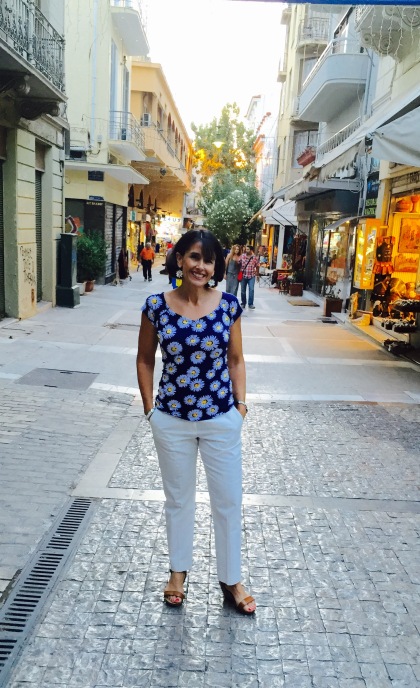 After souvenir and shoe shopping, we always eat at Thanasis, famous for its kebab plates. After eating, a picturesque walk to Thissio is a must-do. You continue past Plaka and walk at the foot of the Acropolis; then an entirely new neighborhood presents itself with countless taverns, cafés, and bars. Street vendors, who come out after dark when the authorities are too tired to arrest them for illegal sales, line the streets with incredible handmade goods. I bought a pair of miniature tsarouhi (traditional Greek shoes with pom-poms) earrings from a lovely Russian woman who has been in Greece for twenty years. It reminded me, once more, how everyone has a story. We chatted for fifteen minutes and I debated taking notes while she spoke, her voluptuous chest heaving, her smile wide with a missing incisor, but my husband gave me that endearing look of “You are my wife tonight, not a writer.” But when one starts writing, every scene, every image becomes one that we want to share because we think it’s important.
After souvenir and shoe shopping, we always eat at Thanasis, famous for its kebab plates. After eating, a picturesque walk to Thissio is a must-do. You continue past Plaka and walk at the foot of the Acropolis; then an entirely new neighborhood presents itself with countless taverns, cafés, and bars. Street vendors, who come out after dark when the authorities are too tired to arrest them for illegal sales, line the streets with incredible handmade goods. I bought a pair of miniature tsarouhi (traditional Greek shoes with pom-poms) earrings from a lovely Russian woman who has been in Greece for twenty years. It reminded me, once more, how everyone has a story. We chatted for fifteen minutes and I debated taking notes while she spoke, her voluptuous chest heaving, her smile wide with a missing incisor, but my husband gave me that endearing look of “You are my wife tonight, not a writer.” But when one starts writing, every scene, every image becomes one that we want to share because we think it’s important.
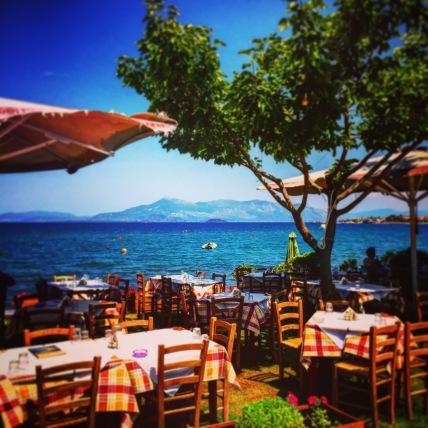 We also met a Nigerian man a few days later in Kamena Vourla whose story was equally fascinating; selling burned CDs he told us that he was a graduate of the University of Athens and held a psychology degree. We talked about politics, life, and literature; about Boko Haram, my Greek aunt who was born in Nigeria, and my Master’s Thesis, which was about the Igbo and Yorubu tribes. When I asked him if he was from one of those tribes, he responded that he was indeed an Igbo and a proud one at that. I had just finished the best-selling novel Amerikanah about a Nigerian woman living in the United States. Jeff, as he introduced himself, pulled out his laptop from his backpack, wrote down the title and author’s name in Notepad, said he loved reading, and would download it that night. Yes, everyone has a story. And every story is important.
We also met a Nigerian man a few days later in Kamena Vourla whose story was equally fascinating; selling burned CDs he told us that he was a graduate of the University of Athens and held a psychology degree. We talked about politics, life, and literature; about Boko Haram, my Greek aunt who was born in Nigeria, and my Master’s Thesis, which was about the Igbo and Yorubu tribes. When I asked him if he was from one of those tribes, he responded that he was indeed an Igbo and a proud one at that. I had just finished the best-selling novel Amerikanah about a Nigerian woman living in the United States. Jeff, as he introduced himself, pulled out his laptop from his backpack, wrote down the title and author’s name in Notepad, said he loved reading, and would download it that night. Yes, everyone has a story. And every story is important.
EPIDAVROS
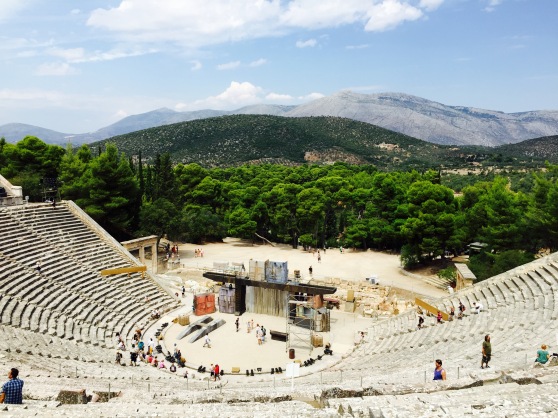
After a few days in Athens, we drove two and a half hours south, past the Corinth Channel to Epidavros where we visited its majestic theatre; built in 340 B.C., it holds 13,000+ spectators and provides unparalleled acoustics. The choice to build this theatre amidst a forest lay in the purposeful decision of the ancient Greeks; the ground was sacred, a magical healing center. Today, one can enjoy a modern or classical performance in this theatre, and the sentiment of “something special” lingers in the air. I sat for a while, after pictures were taken, and digested the view, felt the lumpy marble that cooled my derriere, watched the tourists who stood at the bottom, yelling to their friends in the seats far above to test the strength of a natural speaker. The sky seemed especially blue, the trees too green to be real, and the clouds almost transparent. Surreal, magical, extraordinary.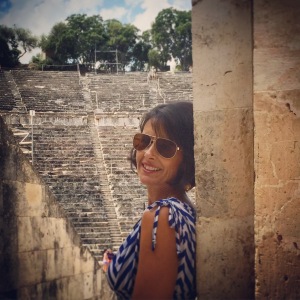
NAFPLIO
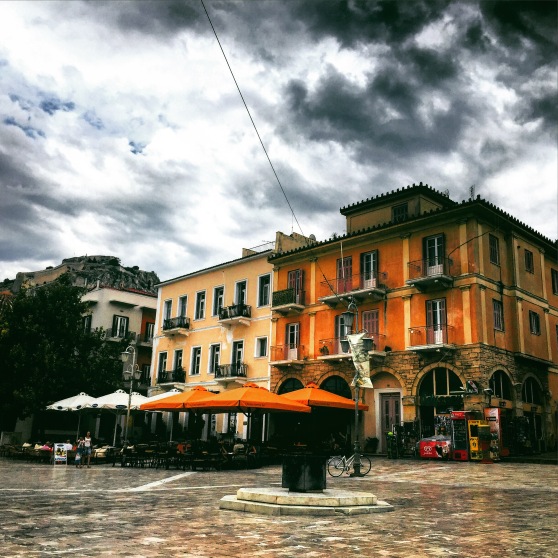 The next stop, about forty minutes from Epidavros, was a city that beheld a beauty of another sort; pink, yellow, and blue houses, a city center that reminded me of Venice, and not surprisingly since the Turks and the Venetians fought for this port city in the 13th century. The influence of the Venetian’s second occupation (1686-1715) is present in the architecture; today balconies adorned with hanging plants and underwear add to the colorful Italian-like setting. Nafplio enjoyed its seat at the first capital of modern Greece from 1829-1834, and although no longer a political hot-spot, it offers bars, cafés and hours of endless roaming.
The next stop, about forty minutes from Epidavros, was a city that beheld a beauty of another sort; pink, yellow, and blue houses, a city center that reminded me of Venice, and not surprisingly since the Turks and the Venetians fought for this port city in the 13th century. The influence of the Venetian’s second occupation (1686-1715) is present in the architecture; today balconies adorned with hanging plants and underwear add to the colorful Italian-like setting. Nafplio enjoyed its seat at the first capital of modern Greece from 1829-1834, and although no longer a political hot-spot, it offers bars, cafés and hours of endless roaming.
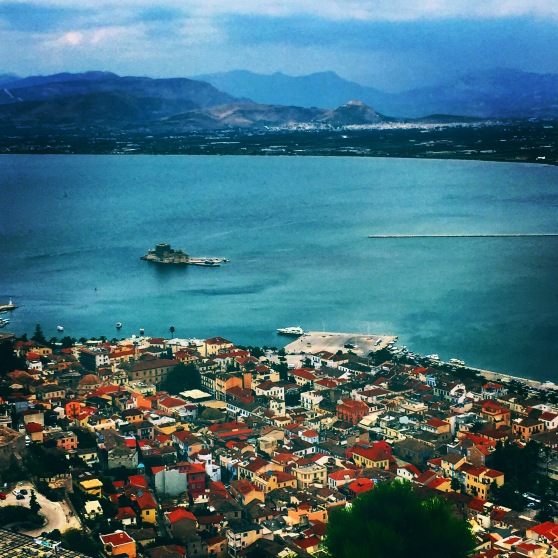 Above Nafplio, a grand Venetian Citadel graces the skyline. It’s a short drive up the hill from Nafplio or a hike with never-ending steps. In August the heat can be unbearable, but that day, the goddesses gave us a slight breeze and a sky speckled with clouds. Yet, every time we wanted to take a picture of Nafplio or the blue water below that surrounded the citadel, the sky opened and the gave us a natural flash.
Above Nafplio, a grand Venetian Citadel graces the skyline. It’s a short drive up the hill from Nafplio or a hike with never-ending steps. In August the heat can be unbearable, but that day, the goddesses gave us a slight breeze and a sky speckled with clouds. Yet, every time we wanted to take a picture of Nafplio or the blue water below that surrounded the citadel, the sky opened and the gave us a natural flash.
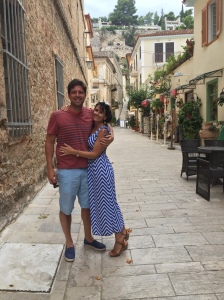 My cousin drove us around that day, and the car ride provided much needed girl-time. My husband dozed in the back seat while we talked about life’s challenges. My cousin is a wise young woman, only thirty-eight, and when we talk, it’s more like a discourse with Socrates. Apart from the financial crisis, personal issues have presented her life with increased challenges. In our conversations, which are more like discourses about the human condition, suffering, and the desire to find peace, we never reach conclusions but philosophize, laugh, and sometimes cry. Mostly there’s a feeling of xelafrosi (a letting go, a lightness) when we are done.
My cousin drove us around that day, and the car ride provided much needed girl-time. My husband dozed in the back seat while we talked about life’s challenges. My cousin is a wise young woman, only thirty-eight, and when we talk, it’s more like a discourse with Socrates. Apart from the financial crisis, personal issues have presented her life with increased challenges. In our conversations, which are more like discourses about the human condition, suffering, and the desire to find peace, we never reach conclusions but philosophize, laugh, and sometimes cry. Mostly there’s a feeling of xelafrosi (a letting go, a lightness) when we are done.
That’s what makes Greece so special for me: it’s the land too, but it’s always been the people—those who are living and those who are dead. One who is gone, physically, is my dear Yiayia. On August 12th, 2015, three car loads of family gathered for my yiayia’s one-year memorial. The forty-day memorial is more important in Greek culture, but my family gathered again to make it special for me, so that I could say my formal goodbye. The last time I has seen Yiayia was the summer before.
A MEMORIAL
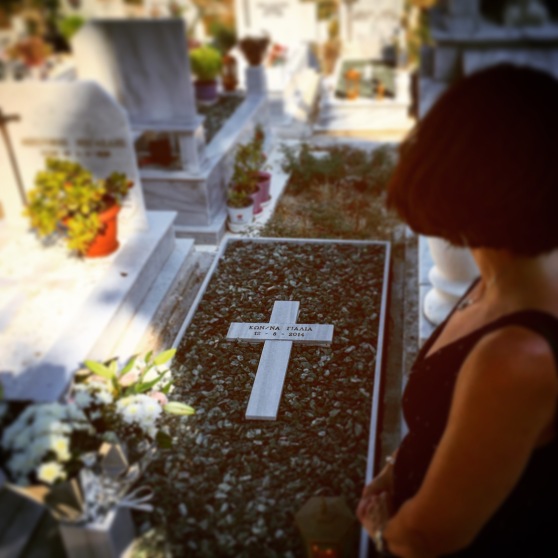 On that hot day in August, we all gathered at the cemetery, the kids ran around, and the adults greeted one another. My aunt made koliva, wheat berries flavored with walnuts, raisins, cinnamon and powdered sugar, a favorite of mine (Yiayia used to make a huge pot just for me—even when someone hadn’t died). After the priest’s prayer, we sat in the church’s café, had Greek coffee, sans the traditional Cognac since my family are not drinkers. I really would have enjoyed some at that moment because even though the family chatter lightened the mood, it felt like a buffalo had sat on my chest.
On that hot day in August, we all gathered at the cemetery, the kids ran around, and the adults greeted one another. My aunt made koliva, wheat berries flavored with walnuts, raisins, cinnamon and powdered sugar, a favorite of mine (Yiayia used to make a huge pot just for me—even when someone hadn’t died). After the priest’s prayer, we sat in the church’s café, had Greek coffee, sans the traditional Cognac since my family are not drinkers. I really would have enjoyed some at that moment because even though the family chatter lightened the mood, it felt like a buffalo had sat on my chest.
When we had arrived to Athens the week before, I had walked though Yiayia’s house; I can’t say that I felt sadness or shock. My cousin lives there now, and my adorable niece and nephew were so excited to show me their new rooms that the ambience felt peaceful and happy. Yiayia was ready to go, so I was grateful that her death provided a home for a family in the time of need.
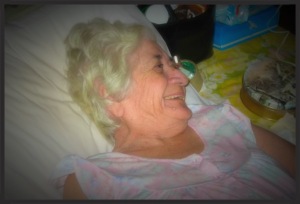 But as as I walked through the cemetery, the feeling was different. I started to feel like I couldn’t breathe. My kooky, fun-loving, naughty Yiayia was no more. She would be lying under a slab of cement decomposing. I won’t dive into religion here; hopefully heaven is real and she is laughing from above. After the prayer, the family left us for a few moments of private time, and I sobbed uncontrollably. Yiayia was ready, she was old, 94! She had led a full, good life. She had twenty people who stood there; many who shed tears again even though they had officially mourned her a year before, their sorrow still palpable.
But as as I walked through the cemetery, the feeling was different. I started to feel like I couldn’t breathe. My kooky, fun-loving, naughty Yiayia was no more. She would be lying under a slab of cement decomposing. I won’t dive into religion here; hopefully heaven is real and she is laughing from above. After the prayer, the family left us for a few moments of private time, and I sobbed uncontrollably. Yiayia was ready, she was old, 94! She had led a full, good life. She had twenty people who stood there; many who shed tears again even though they had officially mourned her a year before, their sorrow still palpable.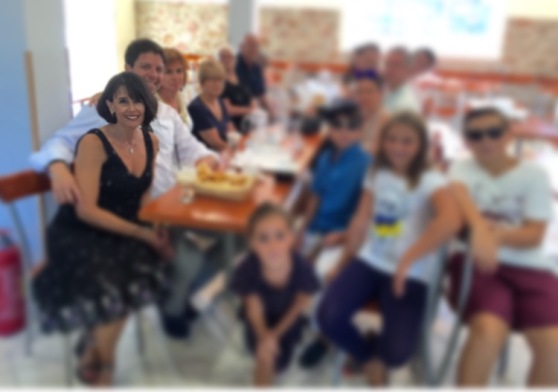
Then, I thought about my own death. When I die, my husband and a few pets will be present. I have never regretted not having children, and as I sat around a table with uncles and aunts, cousins and their children, I felt serene. Maybe a few nieces, family members, or friends will come. I’m blessed with an incredible family. I lack nothing. My husband held my hand and asked me gently with his eyes how I was doing. We all know there are no guarantees in life, who will go first, when, or why, but I know that I live every moment to its fullest and don’t wait for tomorrow’s success to be happy today. We all learned this lesson from Yiayia who was a genuinely happy and mischievous person till the day she closed her eyes.
DELPHI
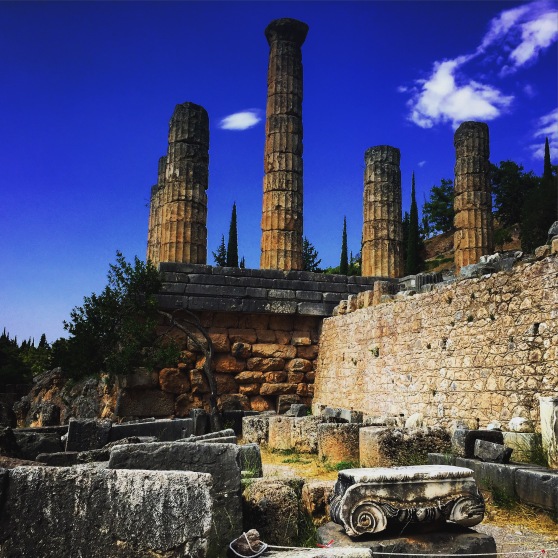
On the way to our summer house, we took a detour to the sanctuary of Apollo at Delphi. According to tradition, Zeus sent two eagles from opposite sides of the universe to find each other at the center. They met at Delphi. Standing in the sanctuary with my husband felt electric. We were at the “omphalos,” navel of the world; at the center, with my center. 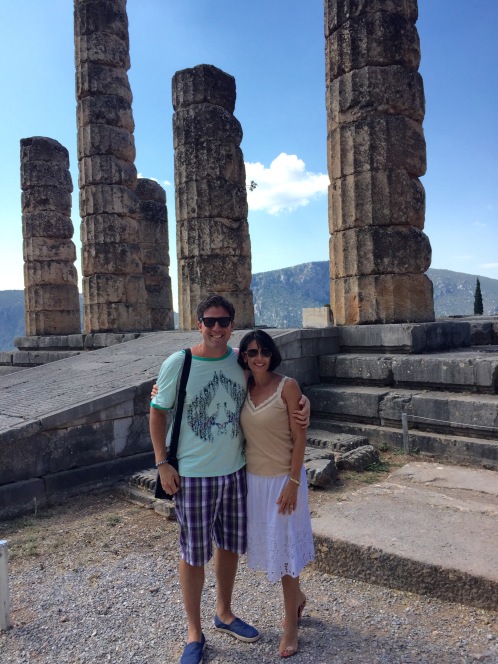 We walked around, took lots of pictures, but always stopped to admire with the naked eye. Visiting the theatre, stadium, and sanctuary, built in the 4th, 5th, and 7th century B.C. respectively, among all the other sites of yellowish-beige marble, demonstrated the creativity and mathematical genius of the Greek people. While we walked down the path, with large looming trees and mountains on all the sides, I could hear the cicadas chirping. It’s a sound that reminds me of good days, happy times, sleeping on the balcony of our summer house, the only care in the world was what I would wear to the disco that night.
We walked around, took lots of pictures, but always stopped to admire with the naked eye. Visiting the theatre, stadium, and sanctuary, built in the 4th, 5th, and 7th century B.C. respectively, among all the other sites of yellowish-beige marble, demonstrated the creativity and mathematical genius of the Greek people. While we walked down the path, with large looming trees and mountains on all the sides, I could hear the cicadas chirping. It’s a sound that reminds me of good days, happy times, sleeping on the balcony of our summer house, the only care in the world was what I would wear to the disco that night.
KAMENA VOURLA
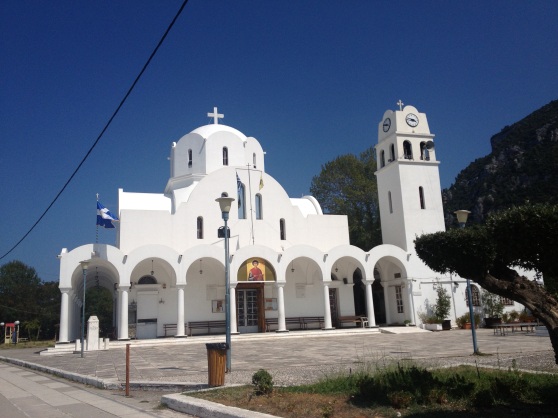 This seaside village, also one of the settings in my novel, Red Greek Tomatoes, provides a sanctuary for my protagonist. Unlike the main character of my novel who goes to Kamena Vourla as a stranger on her way to Delphi and knows no one, I know this village intimately. It’s the village where my grandfather chose to buy a summer cottage in the 60s, so he could fish early in the morning, roll his cigarettes and drink Ouzo at night. And escape from hectic Athens.
This seaside village, also one of the settings in my novel, Red Greek Tomatoes, provides a sanctuary for my protagonist. Unlike the main character of my novel who goes to Kamena Vourla as a stranger on her way to Delphi and knows no one, I know this village intimately. It’s the village where my grandfather chose to buy a summer cottage in the 60s, so he could fish early in the morning, roll his cigarettes and drink Ouzo at night. And escape from hectic Athens.
While in Kamena Vourla, if one wants a break from taverns, Camino Restaurant offers sumptuous dinner and mouthwatering steaks. The popular Mythos and Friend’s Café are also favorites. Both are owned by acquaintances who I see year after year, and though they may temporarily forget my name, I’m always greeted with kisses and a warm welcome as though I am a long-lost friend. That’s what Greeks do; they make you feel special. When my childhood friends smile, hug, and kiss me, it feels like home—it doesn’t matter if we only spend a few hours together, time always stands still and our hearts feel just as connected. My Greek friends are tough-as-nails women who I admire for their strength and tenacity; they don’t count calories, worry about working out, and openly complain about their kids without one ounce of guilt. They are real. They enjoy life. Yes, they are stressed, tired, deal with mother-in-laws who live above them, but they laugh and bitch, then laugh again; no problem is too tough to handle.
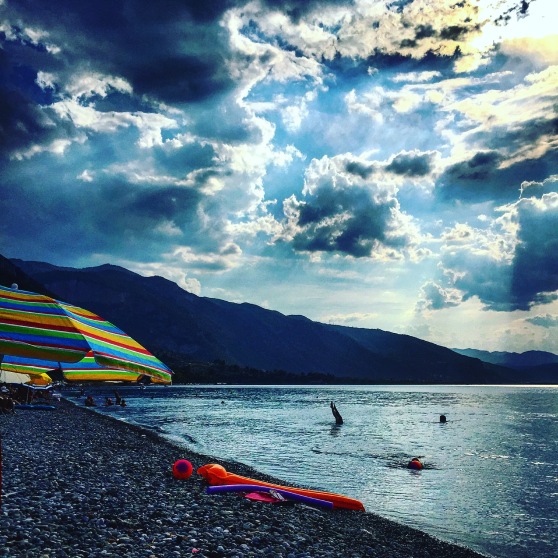 A few kilometers from Kamena Vourla, towards Agios Konstandinos, is Asproneri, a pebble-stone beach that rivals any island one with its clear water and mountain as a backdrop. Thair, my protagonist, falls in love while at this beach so Asproneri is personified in my novel. It’s alive and offers Thair much of what it offered me; when I swim in the water, her hands caress me, the majestic mountains always take my breath away. It’s a sight I never tire of. My husband and I usually stay at the far end, close to the lighthouse where it’s quiet, but a visitor can sit close to the snack shack and see beautiful young bods and older ones who wear all their rolls and cellulite with pride and comfort.
A few kilometers from Kamena Vourla, towards Agios Konstandinos, is Asproneri, a pebble-stone beach that rivals any island one with its clear water and mountain as a backdrop. Thair, my protagonist, falls in love while at this beach so Asproneri is personified in my novel. It’s alive and offers Thair much of what it offered me; when I swim in the water, her hands caress me, the majestic mountains always take my breath away. It’s a sight I never tire of. My husband and I usually stay at the far end, close to the lighthouse where it’s quiet, but a visitor can sit close to the snack shack and see beautiful young bods and older ones who wear all their rolls and cellulite with pride and comfort.
That’s another thing I adore about Greece. Women don’t seem to have body issues. A girl may be 16 and long-legged or 60 with a pudgy belly, every female, despite age or size, wears a bikini. In fact, I don’t think I have ever seen a full swimsuit there. And when women walk to and from the café and order drinks, they don’t hide in a beach wrap. This confidence thrills me; men with their keg-bellies and skinny legs flirt with their eyes as if they are Zeus’ gift to women. When I ordered our freddos at the shack, I debated dropping my sari on the walk back, allowing eyes to critique my ample thighs, but the thought only entered my mind long enough for me to push it out. No way. I tightened the knot of my wrap, held the coffees, one in each hand, and strolled back along the shoreline. I’m only half Greek; my American self-consciousness won this time—again.
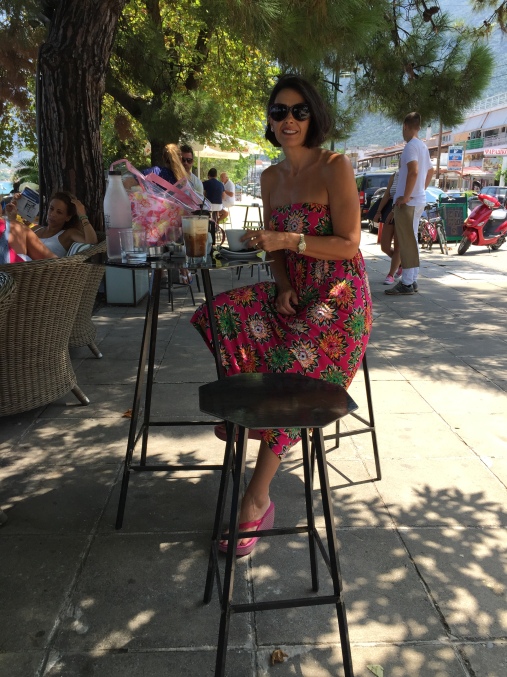 Over the years, the village has changed a lot; or it could be me that’s changed. Kamena Vourla still has romantic appeal with its countless taverns and cafés that line the shore, but—unlike my youth when I could stay for two entire months there—after a few days, I get restless.
Over the years, the village has changed a lot; or it could be me that’s changed. Kamena Vourla still has romantic appeal with its countless taverns and cafés that line the shore, but—unlike my youth when I could stay for two entire months there—after a few days, I get restless.
In my teens we started the evening at Pringipico, a café on the water’s edge, and ended the night dancing at Laxmi Discoteque. Now the disco is a dilapidated structure at the far end of town, and the “in” place is Mythos Café where people spill on to the street, where people go to see and be seen. No more dancing; it saddens me that this new generation just drinks and stands around for endless hours. It also bores me. I don’t get it. A sure sign I am finally getting old. As an aging adult, time is running out, and Greece offers so much beauty and intrigue that after I’ve visited my friends, stood around on the street for three nights in a row, took my cleansing baths at Asproneri, I’m ready to move on.
SKOPELOS
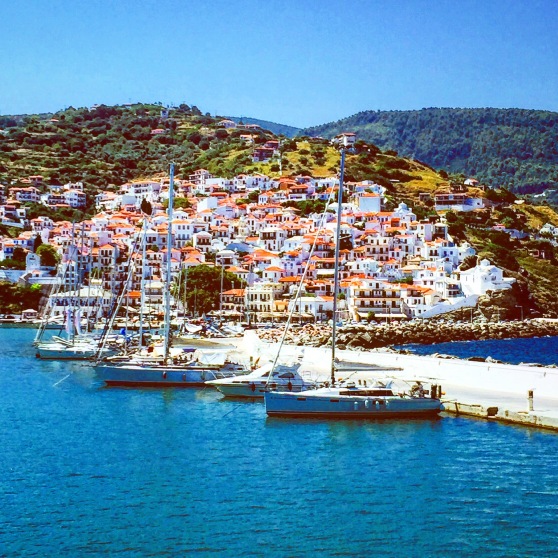 From Kamena Vourla we took the ferry from Agios Konstandinos to the island of Skopelos, also known lately as the “Mamma Mia” island because parts of the movie were filmed there. Skopelos is part of the Sporades islands and offers tranquility, unlike the neighboring island of Skiathos that has a wilder nightlife, but equally beautiful beaches. Again, despite the crisis, Greeks visitors populated the beaches and cafés. We met Italians, Spaniards, saw many blonde Europeans, and heard a few Americans. We stayed in Chora, the main town, at Hotel Dionyssos, a hotel with an excellent breakfast, nice pool, and helpful staff. I met the bartender who was my age, a beautiful brunette who was a French professor in her native Albania and moved to Greece twenty years before. She lives permanently on the island with her Albanian husband and two teenage boys. She tried to teach private French lessons but her degree wasn’t recognized, so she instead, to help support her family, she works full-time tending bar and working in the restaurant. Everyone has a story.
From Kamena Vourla we took the ferry from Agios Konstandinos to the island of Skopelos, also known lately as the “Mamma Mia” island because parts of the movie were filmed there. Skopelos is part of the Sporades islands and offers tranquility, unlike the neighboring island of Skiathos that has a wilder nightlife, but equally beautiful beaches. Again, despite the crisis, Greeks visitors populated the beaches and cafés. We met Italians, Spaniards, saw many blonde Europeans, and heard a few Americans. We stayed in Chora, the main town, at Hotel Dionyssos, a hotel with an excellent breakfast, nice pool, and helpful staff. I met the bartender who was my age, a beautiful brunette who was a French professor in her native Albania and moved to Greece twenty years before. She lives permanently on the island with her Albanian husband and two teenage boys. She tried to teach private French lessons but her degree wasn’t recognized, so she instead, to help support her family, she works full-time tending bar and working in the restaurant. Everyone has a story.
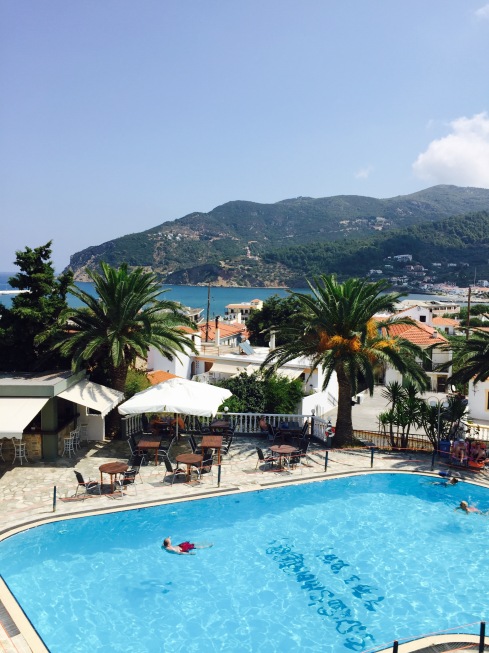 By U.S. standards the hotel was not expensive, but more than my husband and I usually spend when we travel since we spend so little time in the room. The Expedia photos looked inviting, and since the location was ideal, we decided to splurge. Our room, typically Greek: clean, small and simple, did have lovely views of the beach and mountains; mostly the details, little bottles of ouzo and loukoumades in our room to welcome us, added a nice touch.
By U.S. standards the hotel was not expensive, but more than my husband and I usually spend when we travel since we spend so little time in the room. The Expedia photos looked inviting, and since the location was ideal, we decided to splurge. Our room, typically Greek: clean, small and simple, did have lovely views of the beach and mountains; mostly the details, little bottles of ouzo and loukoumades in our room to welcome us, added a nice touch.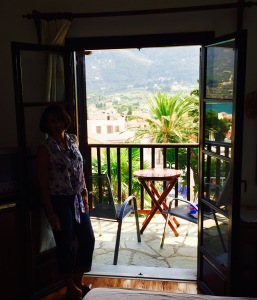
The first day we took an all-day, very inexpensive (12 euros), guided bus tour to the famous church, Agios Ioannis, (from a scene in Mamma Mia) that included stops at several beaches. Some have said that the movie has cheapened this island paradise, but I don’t agree. It has created a bit more tourism, so I think that’s good. If someone expected to see the same grand chapel from the movie, then they don’t understand Hollywood magic. The 202 steps that we climbed to reach this chapel were well worth it because at the top the vast turquoise sea could be seen, and a feeling of romance, indeed, lingered in the air. I signed the church’s registry where couples’ writings filled the pages, notes of love and adoration for their spouse or partner. If you visit the church, check out entries under Summer 2015; maybe you’ll see my name, my husband’s, and my wish for eternal love.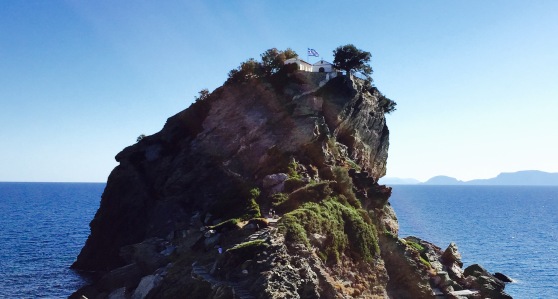
The night life of Skopelos is similar to Kamena Vourla: sitting in cafes, standing in bars, talking, smoking; we did come across a “club” but when we tried to enter at 1 a.m., on our way back to the hotel from a drink at the center, they told us it would not open till 2 a.m but we were welcome to come in and wait. I definitely felt old. The only dancing we would be doing was in our dreams.
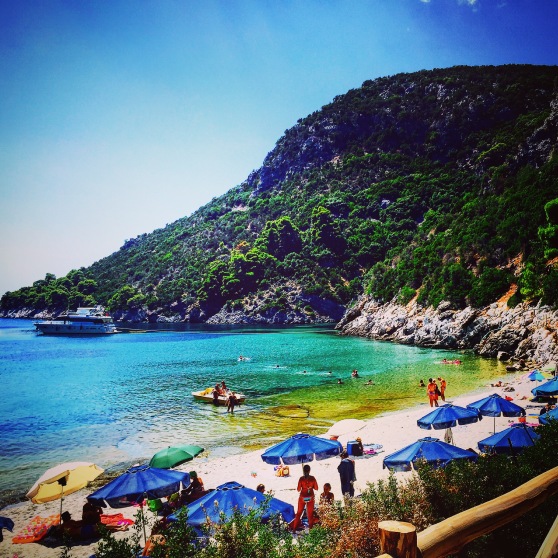 Skopelos with its mountains, valleys, and forests give the island a breezy feeling unlike some other popular islands that I’ve visited with dry landscapes. The greatest appeal of Skopelos are the beaches; from Limnonari to Panormos to Kastani, golden sand and clear water circle the island. Most of these places have beach bars with expensive beer and some food choices though it’s best to wait because the taverns in Chora serve up delicious traditional Greek dishes and fresh seafood for decent prices. It’s known to be a quiet island, one for couples, families, or those who just want tranquility. I found that to be true.
Skopelos with its mountains, valleys, and forests give the island a breezy feeling unlike some other popular islands that I’ve visited with dry landscapes. The greatest appeal of Skopelos are the beaches; from Limnonari to Panormos to Kastani, golden sand and clear water circle the island. Most of these places have beach bars with expensive beer and some food choices though it’s best to wait because the taverns in Chora serve up delicious traditional Greek dishes and fresh seafood for decent prices. It’s known to be a quiet island, one for couples, families, or those who just want tranquility. I found that to be true.
Back to ATHENS
The last day in Athens is always spent returning to Thanasis for a kebab plate and to walk the streets of Plaka. But this year plans changed. We stumbled upon a restaurant that opened its evening terrace for us early, so we enjoyed a spectacular view of the Parthenon. We ate and drank wine for more than two hours and by the time we left, our secluded terrace was filled with more than fifteen tables, never noticing when the tables had been set or the guests arrived. It was a perfect ending to a perfect holiday. Almost perfect. Saying goodbye is always tough. I’m not a fan of phones or Skyping and only call my family a few times a year because when I do, I know we will be on the phone for several hours. Everyone has busy lives, so we all understand because when there’s genuine affection, as corny as it sounds, distance is only measured in kilometers; the hearts remain close.
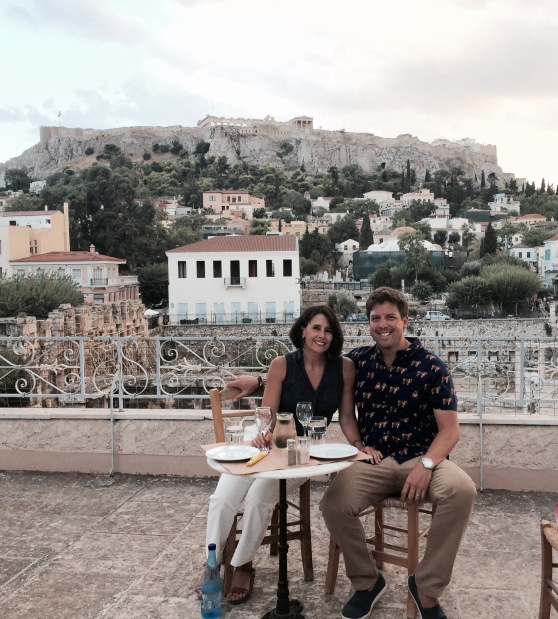 That night, while I leaned on the balcony of the restaurant, with my husband’s arm around me, taking in the sights, life felt complete. It was a cool night for August, a slight breeze blew my bangs in my face. As I moved them to the side, I could see Nike in the distance smiling at me. I know she loves Greece as much as I do.
That night, while I leaned on the balcony of the restaurant, with my husband’s arm around me, taking in the sights, life felt complete. It was a cool night for August, a slight breeze blew my bangs in my face. As I moved them to the side, I could see Nike in the distance smiling at me. I know she loves Greece as much as I do.
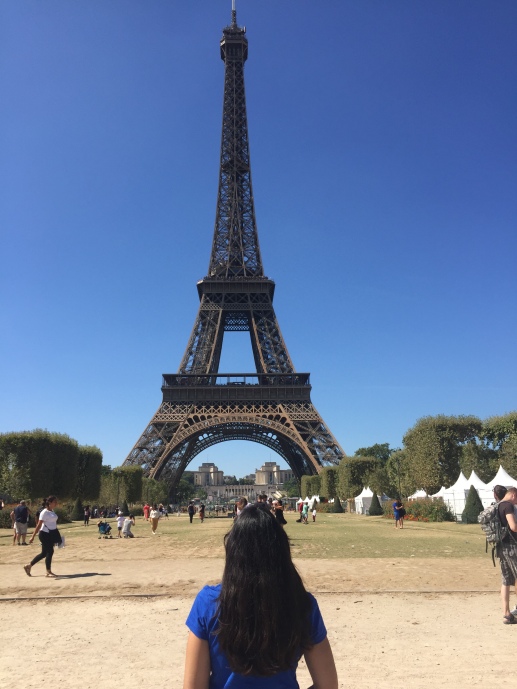
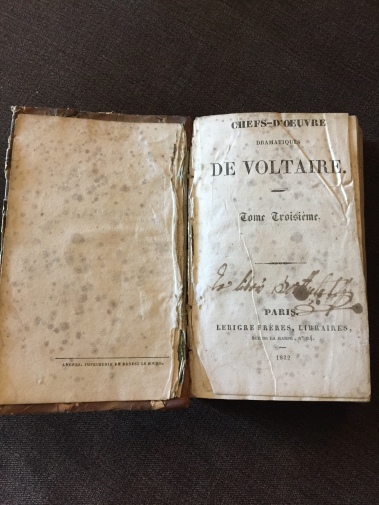
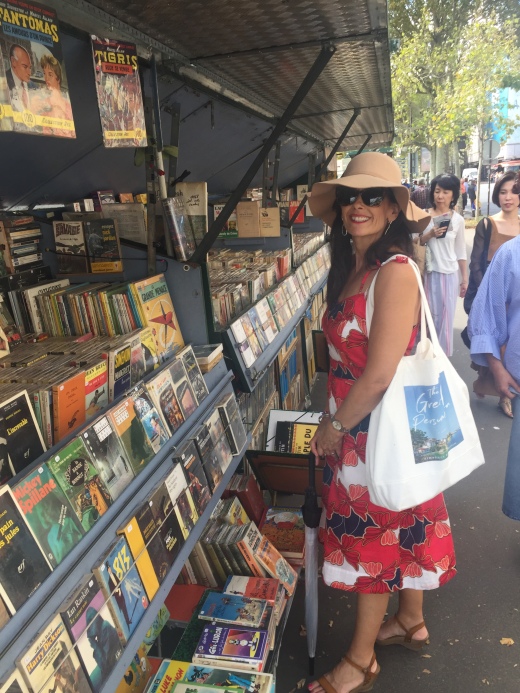
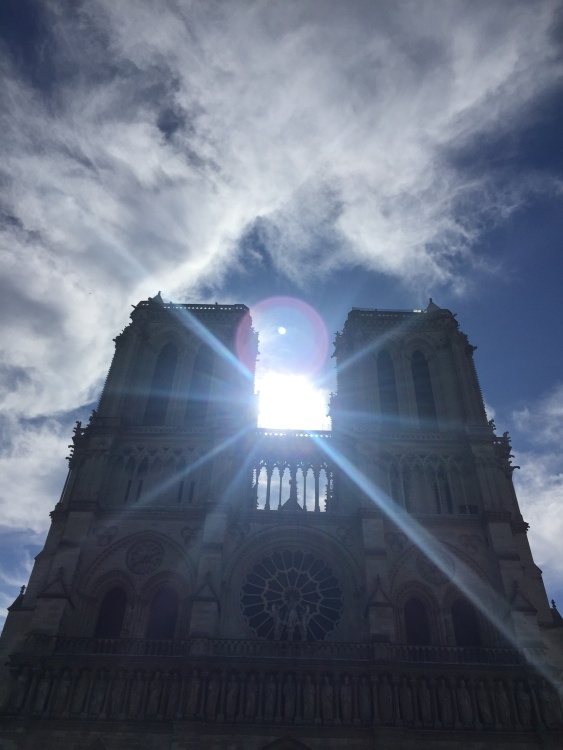
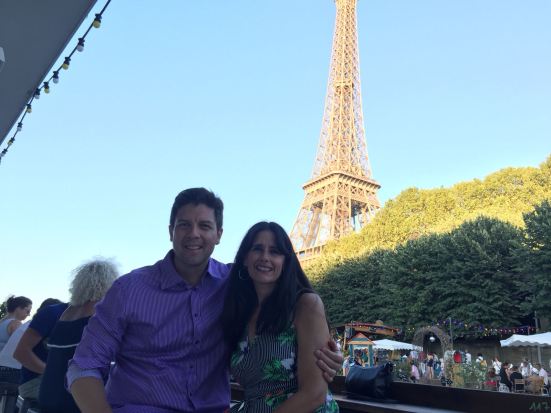
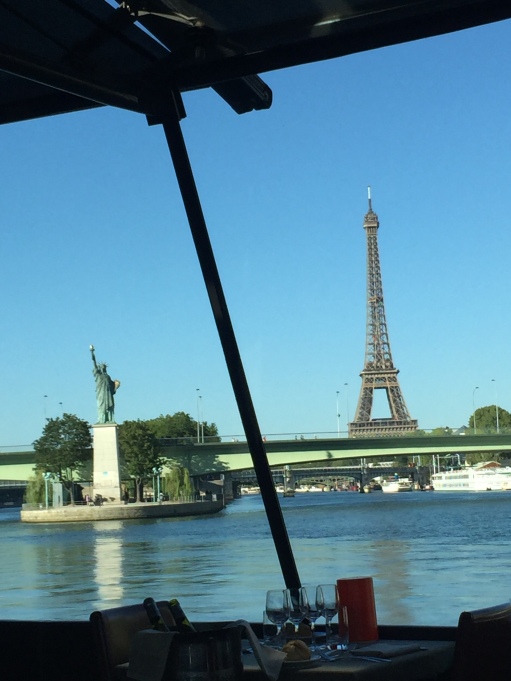
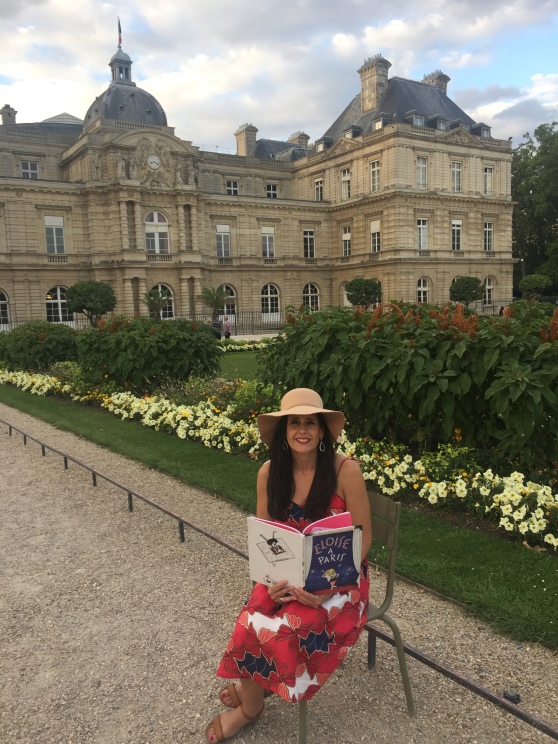
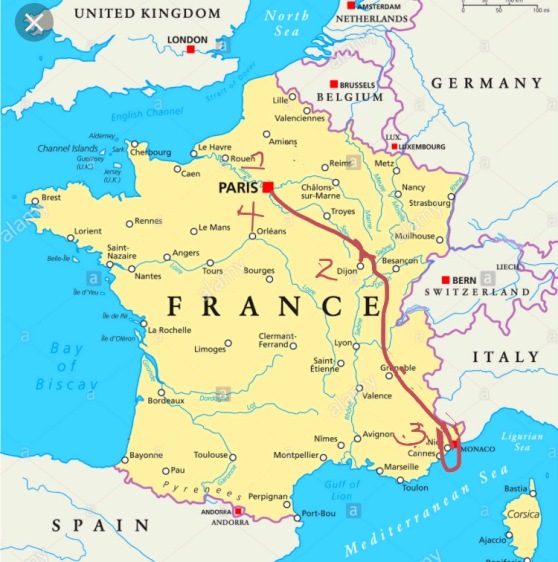
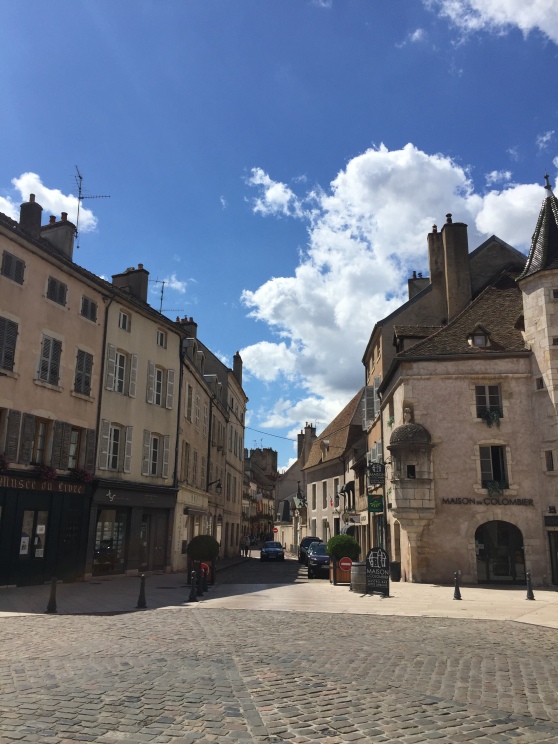 Our Hotel Abbaye de Maizières was a 12th century Abbey with a miniscule entrance to a medieval lobby with red velvet tablecloths, a small wine cellar, and original stone walls.
Our Hotel Abbaye de Maizières was a 12th century Abbey with a miniscule entrance to a medieval lobby with red velvet tablecloths, a small wine cellar, and original stone walls. 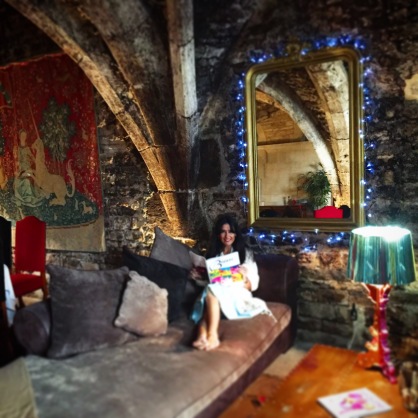 A windy staircase took us up to our tiny room. Despite the size, we loved the feeling of sleeping in a room where monks had lived more than eight hundred years ago.
A windy staircase took us up to our tiny room. Despite the size, we loved the feeling of sleeping in a room where monks had lived more than eight hundred years ago.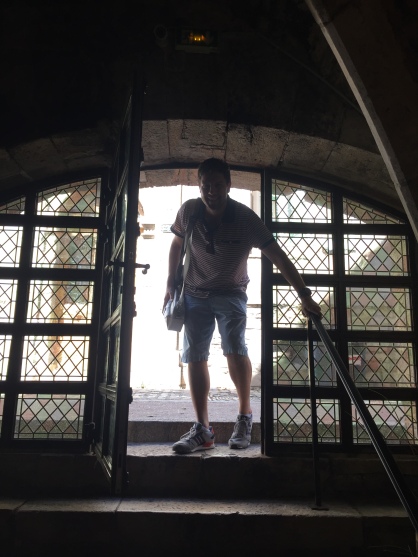
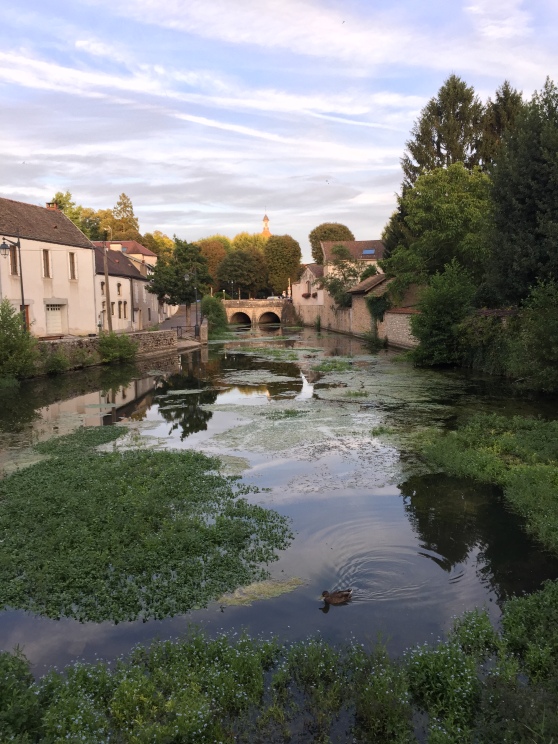
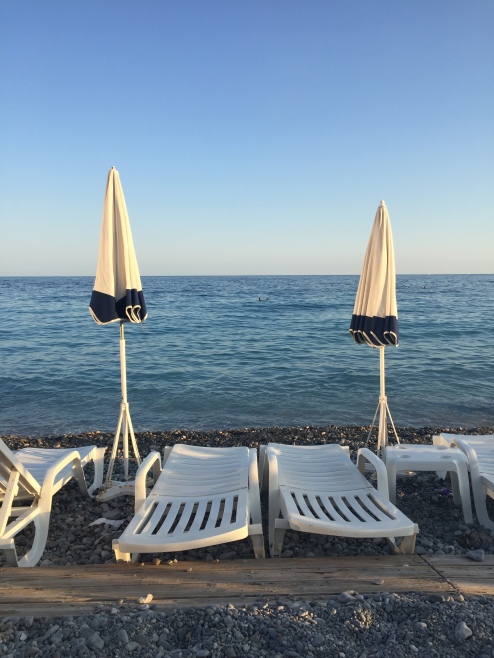
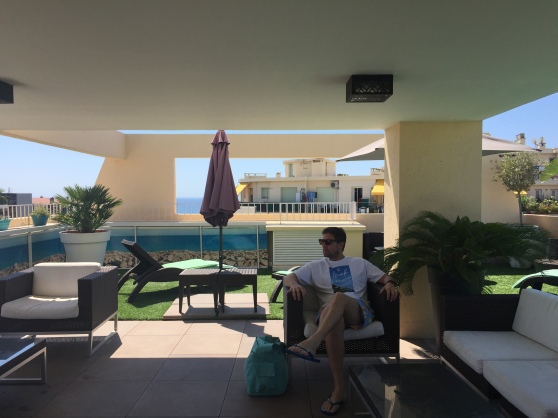 We stayed at Residhome Nice Promenade, a studio apartment that had a kitchen, a balcony, a nice rooftop, and only two blocks away from the promenade. From Nice we took tours to Cannes, Monte Carlo, and St. Paul de Vence.
We stayed at Residhome Nice Promenade, a studio apartment that had a kitchen, a balcony, a nice rooftop, and only two blocks away from the promenade. From Nice we took tours to Cannes, Monte Carlo, and St. Paul de Vence.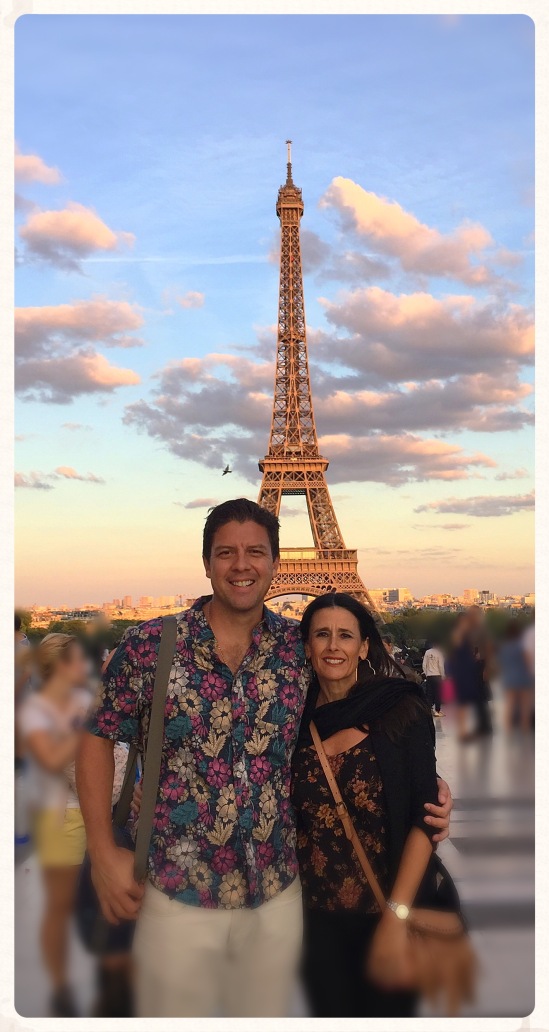 It seems we all want to be somewhere else—my husband and I would move to Greece or France in a heartbeat, but we also know that Los Angeles is home for the next two decades until a suitable pension kicks in. A friend said to me, “People were nice because you and Hugo are nice.” I guess people see that we are genuinely interested in their stories and their country. Sites are fine, but we travel for the sounds, the smells, and the people. And we always said “bonjour” before asking a question; we left shops with a “merci beaucoup and au revoir.” We also smile a lot—because that’s the universal language.
It seems we all want to be somewhere else—my husband and I would move to Greece or France in a heartbeat, but we also know that Los Angeles is home for the next two decades until a suitable pension kicks in. A friend said to me, “People were nice because you and Hugo are nice.” I guess people see that we are genuinely interested in their stories and their country. Sites are fine, but we travel for the sounds, the smells, and the people. And we always said “bonjour” before asking a question; we left shops with a “merci beaucoup and au revoir.” We also smile a lot—because that’s the universal language.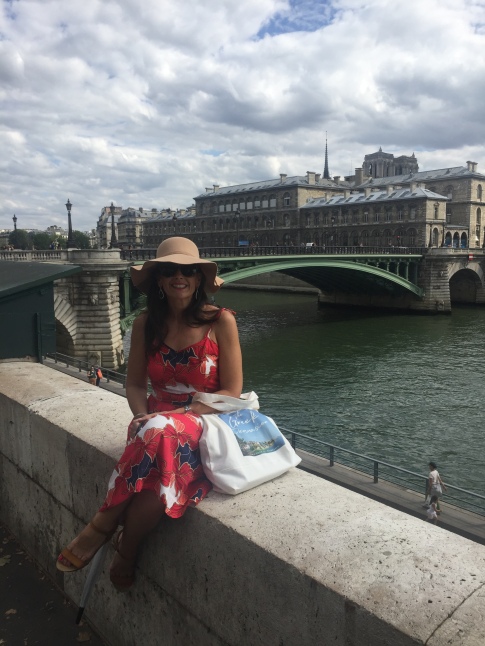
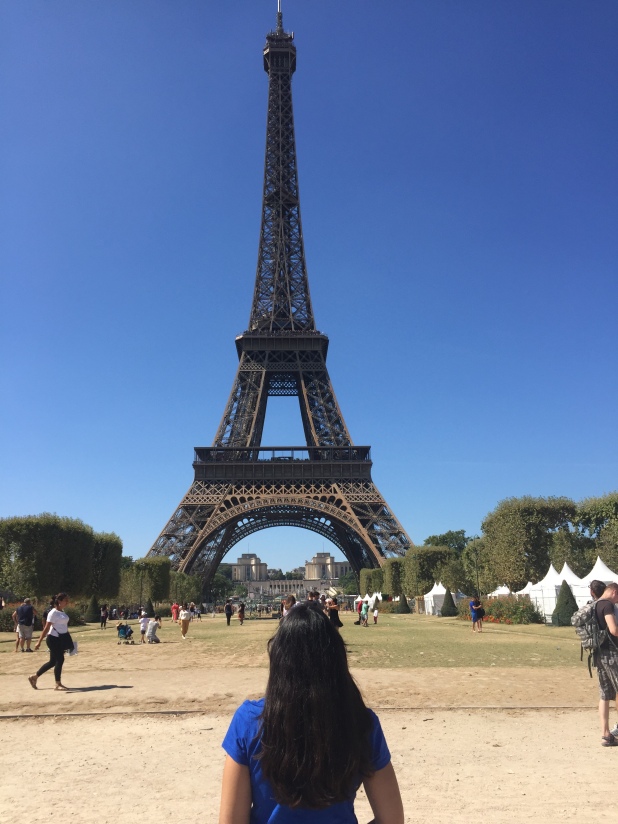



























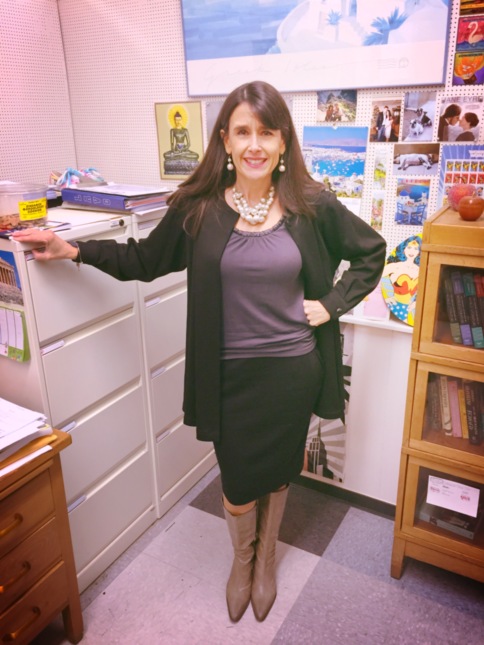
 Reflections of Summer by a Greek American: Travel Tips and Personal Stories
Reflections of Summer by a Greek American: Travel Tips and Personal Stories When I’m in Greece, I’m another person. I drink wine by the kilo, eat lots of bread dipped in tzaziki, devour souvlakia filled with greasy gyro, suck on endless red Greek tomatoes—and I never step on a scale. Funny thing is, I don’t gain a pound. There is a lightness inside that permeates outward, sucking away the fatness of stress. Of course, I am on vacation with time, money, and a fun husband—why shouldn’t I be happy? But it’s something else. Being around Greeks, in Greece, recharges my battery. These people are beyond resilient, and this vivacity gives me strength. If Greeks can struggle, fight, and still laugh, then so can I. Despite the melee, Nike still seems to fly over Greece and, I believe, in time they will be victorious.
When I’m in Greece, I’m another person. I drink wine by the kilo, eat lots of bread dipped in tzaziki, devour souvlakia filled with greasy gyro, suck on endless red Greek tomatoes—and I never step on a scale. Funny thing is, I don’t gain a pound. There is a lightness inside that permeates outward, sucking away the fatness of stress. Of course, I am on vacation with time, money, and a fun husband—why shouldn’t I be happy? But it’s something else. Being around Greeks, in Greece, recharges my battery. These people are beyond resilient, and this vivacity gives me strength. If Greeks can struggle, fight, and still laugh, then so can I. Despite the melee, Nike still seems to fly over Greece and, I believe, in time they will be victorious. Playing with my cousins and their kids in the blue water of Vouliagmeni reminded me why Athens is my favorite city in the entire world. Some parts of the city such as Kyfissia and Kolonaki offer posh shops, cafés, high fashion, and people-watching; other districts like Glyfada and Voula have the aforementioned but also provide island-like beaches—complete with chaise lounges, umbrellas, and cafés on the shoreline. For a few euros, one enters and can stay all day; have the freedom to drink beer on the beach or have a freddo cappuccino, and then a club sandwich or a tyropita. Somewhere in between these districts is Nea Smirni, where my family reside, and where my mother owns a house. I adore the neighborhood and feel quite at home there as does my husband who has visited six times. If I’m deep in Greek with my cousins, my husband disappears to the local platea (district’s center) to get a gyros at his favorite taverna or to relax at his favorite café. He knows how to say, “Freddo cappuccino metreo” and “Then milao Ellinika” (I don’t speak Greek). When we first met, he asked me how to say, “Hello, how are you?” So I taught him: “Eho geneka Elinitha, i kaliteri.” It was years later when he greeted someone with this phrase that I realized I had forgotten to tell him it actually meant, “I have a Greek wife and she’s the best.” But he forgave me and we still have a good laugh about it.
Playing with my cousins and their kids in the blue water of Vouliagmeni reminded me why Athens is my favorite city in the entire world. Some parts of the city such as Kyfissia and Kolonaki offer posh shops, cafés, high fashion, and people-watching; other districts like Glyfada and Voula have the aforementioned but also provide island-like beaches—complete with chaise lounges, umbrellas, and cafés on the shoreline. For a few euros, one enters and can stay all day; have the freedom to drink beer on the beach or have a freddo cappuccino, and then a club sandwich or a tyropita. Somewhere in between these districts is Nea Smirni, where my family reside, and where my mother owns a house. I adore the neighborhood and feel quite at home there as does my husband who has visited six times. If I’m deep in Greek with my cousins, my husband disappears to the local platea (district’s center) to get a gyros at his favorite taverna or to relax at his favorite café. He knows how to say, “Freddo cappuccino metreo” and “Then milao Ellinika” (I don’t speak Greek). When we first met, he asked me how to say, “Hello, how are you?” So I taught him: “Eho geneka Elinitha, i kaliteri.” It was years later when he greeted someone with this phrase that I realized I had forgotten to tell him it actually meant, “I have a Greek wife and she’s the best.” But he forgave me and we still have a good laugh about it. After souvenir and shoe shopping, we always eat at Thanasis, famous for its kebab plates. After eating, a picturesque walk to Thissio is a must-do. You continue past Plaka and walk at the foot of the Acropolis; then an entirely new neighborhood presents itself with countless taverns, cafés, and bars. Street vendors, who come out after dark when the authorities are too tired to arrest them for illegal sales, line the streets with incredible handmade goods. I bought a pair of miniature tsarouhi (traditional Greek shoes with pom-poms) earrings from a lovely Russian woman who has been in Greece for twenty years. It reminded me, once more, how everyone has a story. We chatted for fifteen minutes and I debated taking notes while she spoke, her voluptuous chest heaving, her smile wide with a missing incisor, but my husband gave me that endearing look of “You are my wife tonight, not a writer.” But when one starts writing, every scene, every image becomes one that we want to share because we think it’s important.
After souvenir and shoe shopping, we always eat at Thanasis, famous for its kebab plates. After eating, a picturesque walk to Thissio is a must-do. You continue past Plaka and walk at the foot of the Acropolis; then an entirely new neighborhood presents itself with countless taverns, cafés, and bars. Street vendors, who come out after dark when the authorities are too tired to arrest them for illegal sales, line the streets with incredible handmade goods. I bought a pair of miniature tsarouhi (traditional Greek shoes with pom-poms) earrings from a lovely Russian woman who has been in Greece for twenty years. It reminded me, once more, how everyone has a story. We chatted for fifteen minutes and I debated taking notes while she spoke, her voluptuous chest heaving, her smile wide with a missing incisor, but my husband gave me that endearing look of “You are my wife tonight, not a writer.” But when one starts writing, every scene, every image becomes one that we want to share because we think it’s important. We also met a Nigerian man a few days later in Kamena Vourla whose story was equally fascinating; selling burned CDs he told us that he was a graduate of the University of Athens and held a psychology degree. We talked about politics, life, and literature; about Boko Haram, my Greek aunt who was born in Nigeria, and my Master’s Thesis, which was about the Igbo and Yorubu tribes. When I asked him if he was from one of those tribes, he responded that he was indeed an Igbo and a proud one at that. I had just finished the best-selling novel Amerikanah about a Nigerian woman living in the United States. Jeff, as he introduced himself, pulled out his laptop from his backpack, wrote down the title and author’s name in Notepad, said he loved reading, and would download it that night. Yes, everyone has a story. And every story is important.
We also met a Nigerian man a few days later in Kamena Vourla whose story was equally fascinating; selling burned CDs he told us that he was a graduate of the University of Athens and held a psychology degree. We talked about politics, life, and literature; about Boko Haram, my Greek aunt who was born in Nigeria, and my Master’s Thesis, which was about the Igbo and Yorubu tribes. When I asked him if he was from one of those tribes, he responded that he was indeed an Igbo and a proud one at that. I had just finished the best-selling novel Amerikanah about a Nigerian woman living in the United States. Jeff, as he introduced himself, pulled out his laptop from his backpack, wrote down the title and author’s name in Notepad, said he loved reading, and would download it that night. Yes, everyone has a story. And every story is important.

 The next stop, about forty minutes from Epidavros, was a city that beheld a beauty of another sort; pink, yellow, and blue houses, a city center that reminded me of Venice, and not surprisingly since the Turks and the Venetians fought for this port city in the 13th century. The influence of the Venetian’s second occupation (1686-1715) is present in the architecture; today balconies adorned with hanging plants and underwear add to the colorful Italian-like setting. Nafplio enjoyed its seat at the first capital of modern Greece from 1829-1834, and although no longer a political hot-spot, it offers bars, cafés and hours of endless roaming.
The next stop, about forty minutes from Epidavros, was a city that beheld a beauty of another sort; pink, yellow, and blue houses, a city center that reminded me of Venice, and not surprisingly since the Turks and the Venetians fought for this port city in the 13th century. The influence of the Venetian’s second occupation (1686-1715) is present in the architecture; today balconies adorned with hanging plants and underwear add to the colorful Italian-like setting. Nafplio enjoyed its seat at the first capital of modern Greece from 1829-1834, and although no longer a political hot-spot, it offers bars, cafés and hours of endless roaming. Above Nafplio, a grand Venetian Citadel graces the skyline. It’s a short drive up the hill from Nafplio or a hike with never-ending steps. In August the heat can be unbearable, but that day, the goddesses gave us a slight breeze and a sky speckled with clouds. Yet, every time we wanted to take a picture of Nafplio or the blue water below that surrounded the citadel, the sky opened and the gave us a natural flash.
Above Nafplio, a grand Venetian Citadel graces the skyline. It’s a short drive up the hill from Nafplio or a hike with never-ending steps. In August the heat can be unbearable, but that day, the goddesses gave us a slight breeze and a sky speckled with clouds. Yet, every time we wanted to take a picture of Nafplio or the blue water below that surrounded the citadel, the sky opened and the gave us a natural flash. My cousin drove us around that day, and the car ride provided much needed girl-time. My husband dozed in the back seat while we talked about life’s challenges. My cousin is a wise young woman, only thirty-eight, and when we talk, it’s more like a discourse with Socrates. Apart from the financial crisis, personal issues have presented her life with increased challenges. In our conversations, which are more like discourses about the human condition, suffering, and the desire to find peace, we never reach conclusions but philosophize, laugh, and sometimes cry. Mostly there’s a feeling of xelafrosi (a letting go, a lightness) when we are done.
My cousin drove us around that day, and the car ride provided much needed girl-time. My husband dozed in the back seat while we talked about life’s challenges. My cousin is a wise young woman, only thirty-eight, and when we talk, it’s more like a discourse with Socrates. Apart from the financial crisis, personal issues have presented her life with increased challenges. In our conversations, which are more like discourses about the human condition, suffering, and the desire to find peace, we never reach conclusions but philosophize, laugh, and sometimes cry. Mostly there’s a feeling of xelafrosi (a letting go, a lightness) when we are done. On that hot day in August, we all gathered at the cemetery, the kids ran around, and the adults greeted one another. My aunt made koliva, wheat berries flavored with walnuts, raisins, cinnamon and powdered sugar, a favorite of mine (Yiayia used to make a huge pot just for me—even when someone hadn’t died). After the priest’s prayer, we sat in the church’s café, had Greek coffee, sans the traditional Cognac since my family are not drinkers. I really would have enjoyed some at that moment because even though the family chatter lightened the mood, it felt like a buffalo had sat on my chest.
On that hot day in August, we all gathered at the cemetery, the kids ran around, and the adults greeted one another. My aunt made koliva, wheat berries flavored with walnuts, raisins, cinnamon and powdered sugar, a favorite of mine (Yiayia used to make a huge pot just for me—even when someone hadn’t died). After the priest’s prayer, we sat in the church’s café, had Greek coffee, sans the traditional Cognac since my family are not drinkers. I really would have enjoyed some at that moment because even though the family chatter lightened the mood, it felt like a buffalo had sat on my chest. But as as I walked through the cemetery, the feeling was different. I started to feel like I couldn’t breathe. My kooky, fun-loving, naughty Yiayia was no more. She would be lying under a slab of cement decomposing. I won’t dive into religion here; hopefully heaven is real and she is laughing from above. After the prayer, the family left us for a few moments of private time, and I sobbed uncontrollably. Yiayia was ready, she was old, 94! She had led a full, good life. She had twenty people who stood there; many who shed tears again even though they had officially mourned her a year before, their sorrow still palpable.
But as as I walked through the cemetery, the feeling was different. I started to feel like I couldn’t breathe. My kooky, fun-loving, naughty Yiayia was no more. She would be lying under a slab of cement decomposing. I won’t dive into religion here; hopefully heaven is real and she is laughing from above. After the prayer, the family left us for a few moments of private time, and I sobbed uncontrollably. Yiayia was ready, she was old, 94! She had led a full, good life. She had twenty people who stood there; many who shed tears again even though they had officially mourned her a year before, their sorrow still palpable.

 We walked around, took lots of pictures, but always stopped to admire with the naked eye. Visiting the theatre, stadium, and sanctuary, built in the 4th, 5th, and 7th century B.C. respectively, among all the other sites of yellowish-beige marble, demonstrated the creativity and mathematical genius of the Greek people. While we walked down the path, with large looming trees and mountains on all the sides, I could hear the cicadas chirping. It’s a sound that reminds me of good days, happy times, sleeping on the balcony of our summer house, the only care in the world was what I would wear to the disco that night.
We walked around, took lots of pictures, but always stopped to admire with the naked eye. Visiting the theatre, stadium, and sanctuary, built in the 4th, 5th, and 7th century B.C. respectively, among all the other sites of yellowish-beige marble, demonstrated the creativity and mathematical genius of the Greek people. While we walked down the path, with large looming trees and mountains on all the sides, I could hear the cicadas chirping. It’s a sound that reminds me of good days, happy times, sleeping on the balcony of our summer house, the only care in the world was what I would wear to the disco that night. This seaside village, also one of the settings in my novel, Red Greek Tomatoes, provides a sanctuary for my protagonist. Unlike the main character of my novel who goes to Kamena Vourla as a stranger on her way to Delphi and knows no one, I know this village intimately. It’s the village where my grandfather chose to buy a summer cottage in the 60s, so he could fish early in the morning, roll his cigarettes and drink Ouzo at night. And escape from hectic Athens.
This seaside village, also one of the settings in my novel, Red Greek Tomatoes, provides a sanctuary for my protagonist. Unlike the main character of my novel who goes to Kamena Vourla as a stranger on her way to Delphi and knows no one, I know this village intimately. It’s the village where my grandfather chose to buy a summer cottage in the 60s, so he could fish early in the morning, roll his cigarettes and drink Ouzo at night. And escape from hectic Athens. A few kilometers from Kamena Vourla, towards Agios Konstandinos, is Asproneri, a pebble-stone beach that rivals any island one with its clear water and mountain as a backdrop. Thair, my protagonist, falls in love while at this beach so Asproneri is personified in my novel. It’s alive and offers Thair much of what it offered me; when I swim in the water, her hands caress me, the majestic mountains always take my breath away. It’s a sight I never tire of. My husband and I usually stay at the far end, close to the lighthouse where it’s quiet, but a visitor can sit close to the snack shack and see beautiful young bods and older ones who wear all their rolls and cellulite with pride and comfort.
A few kilometers from Kamena Vourla, towards Agios Konstandinos, is Asproneri, a pebble-stone beach that rivals any island one with its clear water and mountain as a backdrop. Thair, my protagonist, falls in love while at this beach so Asproneri is personified in my novel. It’s alive and offers Thair much of what it offered me; when I swim in the water, her hands caress me, the majestic mountains always take my breath away. It’s a sight I never tire of. My husband and I usually stay at the far end, close to the lighthouse where it’s quiet, but a visitor can sit close to the snack shack and see beautiful young bods and older ones who wear all their rolls and cellulite with pride and comfort. Over the years, the village has changed a lot; or it could be me that’s changed. Kamena Vourla still has romantic appeal with its countless taverns and cafés that line the shore, but—unlike my youth when I could stay for two entire months there—after a few days, I get restless.
Over the years, the village has changed a lot; or it could be me that’s changed. Kamena Vourla still has romantic appeal with its countless taverns and cafés that line the shore, but—unlike my youth when I could stay for two entire months there—after a few days, I get restless. From Kamena Vourla we took the ferry from Agios Konstandinos to the island of Skopelos, also known lately as the “Mamma Mia” island because parts of the movie were filmed there. Skopelos is part of the Sporades islands and offers tranquility, unlike the neighboring island of Skiathos that has a wilder nightlife, but equally beautiful beaches. Again, despite the crisis, Greeks visitors populated the beaches and cafés. We met Italians, Spaniards, saw many blonde Europeans, and heard a few Americans. We stayed in Chora, the main town, at Hotel Dionyssos, a hotel with an excellent breakfast, nice pool, and helpful staff. I met the bartender who was my age, a beautiful brunette who was a French professor in her native Albania and moved to Greece twenty years before. She lives permanently on the island with her Albanian husband and two teenage boys. She tried to teach private French lessons but her degree wasn’t recognized, so she instead, to help support her family, she works full-time tending bar and working in the restaurant. Everyone has a story.
From Kamena Vourla we took the ferry from Agios Konstandinos to the island of Skopelos, also known lately as the “Mamma Mia” island because parts of the movie were filmed there. Skopelos is part of the Sporades islands and offers tranquility, unlike the neighboring island of Skiathos that has a wilder nightlife, but equally beautiful beaches. Again, despite the crisis, Greeks visitors populated the beaches and cafés. We met Italians, Spaniards, saw many blonde Europeans, and heard a few Americans. We stayed in Chora, the main town, at Hotel Dionyssos, a hotel with an excellent breakfast, nice pool, and helpful staff. I met the bartender who was my age, a beautiful brunette who was a French professor in her native Albania and moved to Greece twenty years before. She lives permanently on the island with her Albanian husband and two teenage boys. She tried to teach private French lessons but her degree wasn’t recognized, so she instead, to help support her family, she works full-time tending bar and working in the restaurant. Everyone has a story. By U.S. standards the hotel was not expensive, but more than my husband and I usually spend when we travel since we spend so little time in the room. The Expedia photos looked inviting, and since the location was ideal, we decided to splurge. Our room, typically Greek: clean, small and simple, did have lovely views of the beach and mountains; mostly the details, little bottles of ouzo and loukoumades in our room to welcome us, added a nice touch.
By U.S. standards the hotel was not expensive, but more than my husband and I usually spend when we travel since we spend so little time in the room. The Expedia photos looked inviting, and since the location was ideal, we decided to splurge. Our room, typically Greek: clean, small and simple, did have lovely views of the beach and mountains; mostly the details, little bottles of ouzo and loukoumades in our room to welcome us, added a nice touch.

 Skopelos with its mountains, valleys, and forests give the island a breezy feeling unlike some other popular islands that I’ve visited with dry landscapes. The greatest appeal of Skopelos are the beaches; from Limnonari to Panormos to Kastani, golden sand and clear water circle the island. Most of these places have beach bars with expensive beer and some food choices though it’s best to wait because the taverns in Chora serve up delicious traditional Greek dishes and fresh seafood for decent prices. It’s known to be a quiet island, one for couples, families, or those who just want tranquility. I found that to be true.
Skopelos with its mountains, valleys, and forests give the island a breezy feeling unlike some other popular islands that I’ve visited with dry landscapes. The greatest appeal of Skopelos are the beaches; from Limnonari to Panormos to Kastani, golden sand and clear water circle the island. Most of these places have beach bars with expensive beer and some food choices though it’s best to wait because the taverns in Chora serve up delicious traditional Greek dishes and fresh seafood for decent prices. It’s known to be a quiet island, one for couples, families, or those who just want tranquility. I found that to be true. That night, while I leaned on the balcony of the restaurant, with my husband’s arm around me, taking in the sights, life felt complete. It was a cool night for August, a slight breeze blew my bangs in my face. As I moved them to the side, I could see Nike in the distance smiling at me. I know she loves Greece as much as I do.
That night, while I leaned on the balcony of the restaurant, with my husband’s arm around me, taking in the sights, life felt complete. It was a cool night for August, a slight breeze blew my bangs in my face. As I moved them to the side, I could see Nike in the distance smiling at me. I know she loves Greece as much as I do.